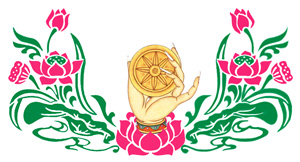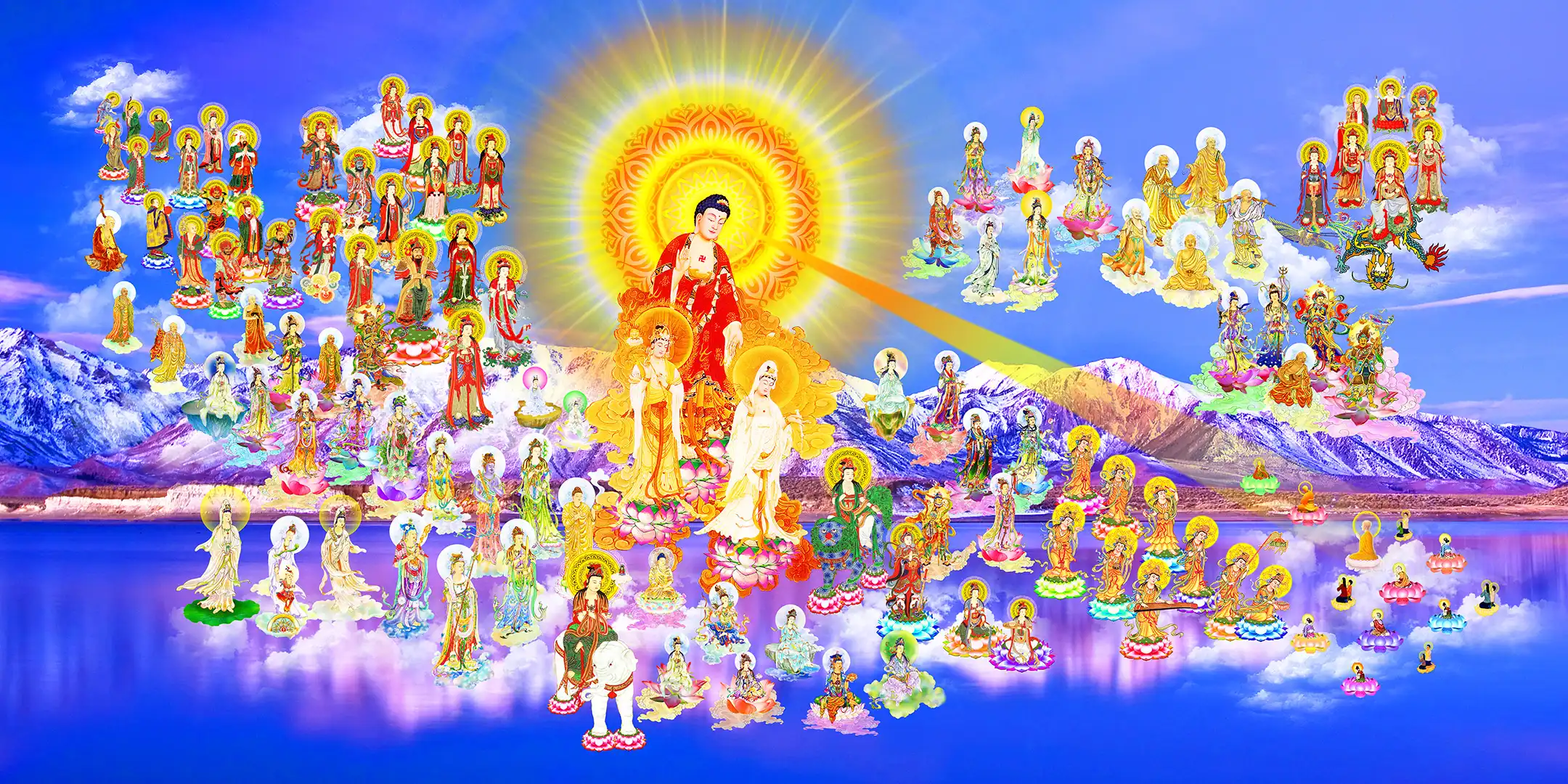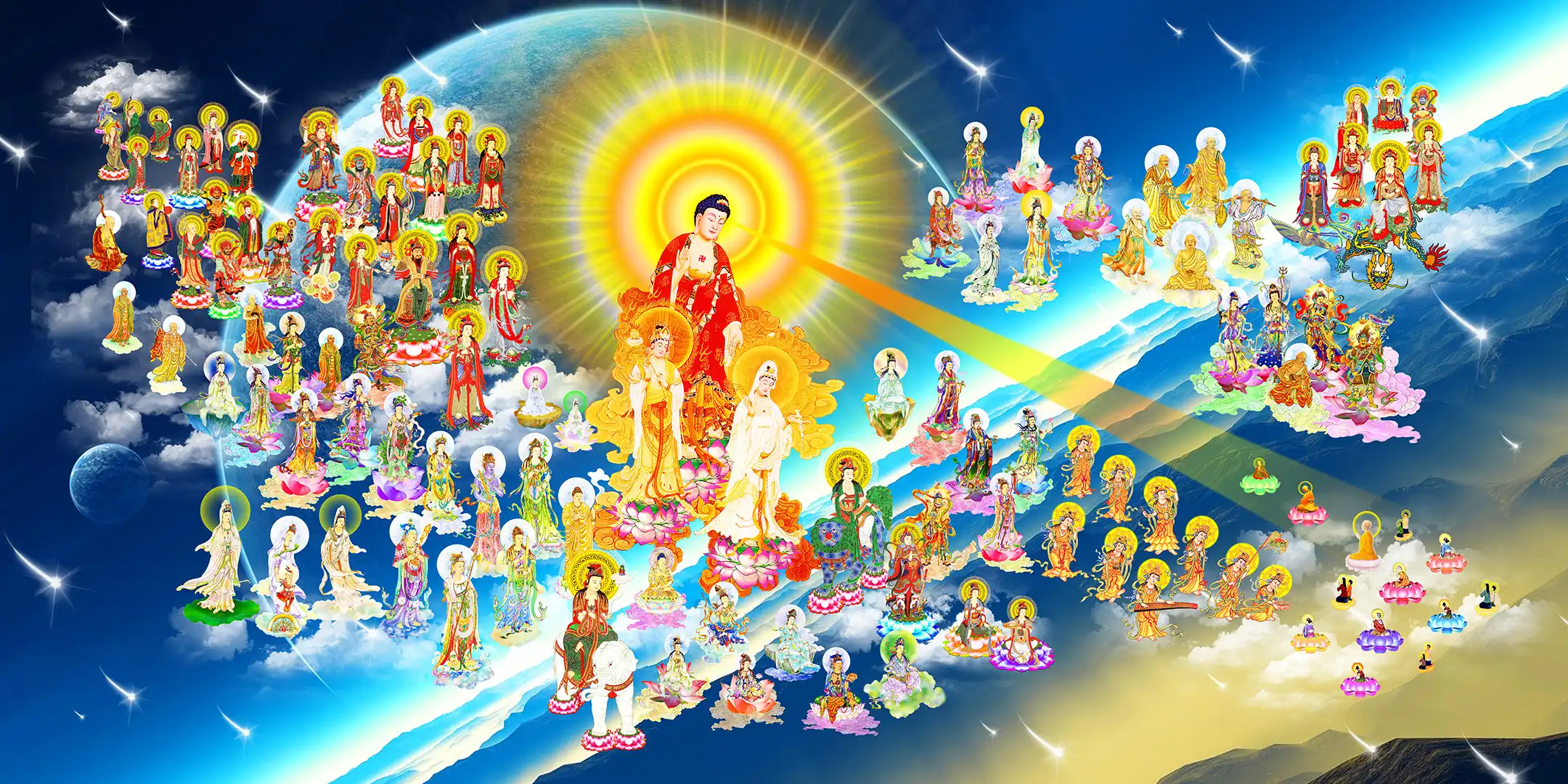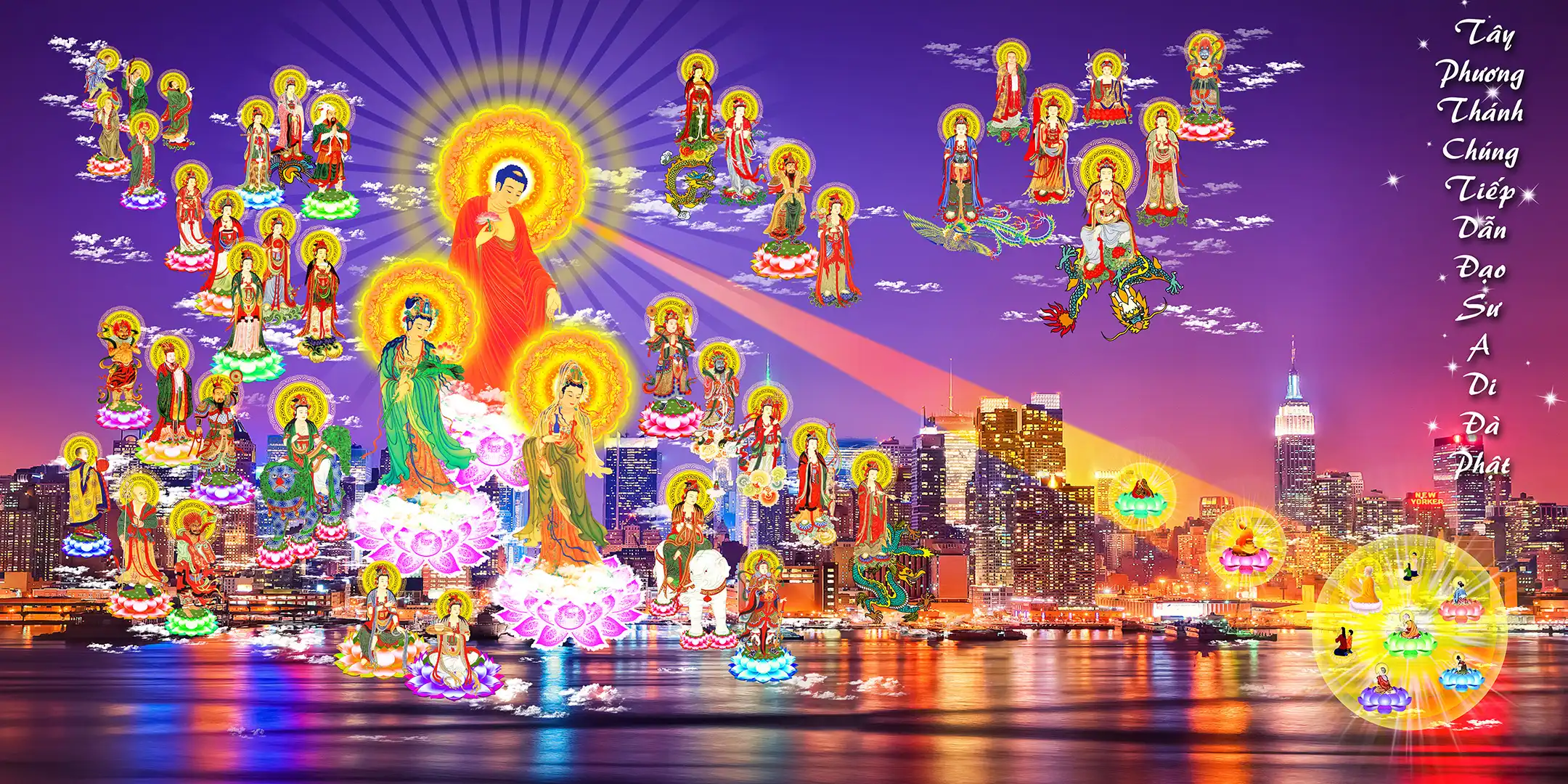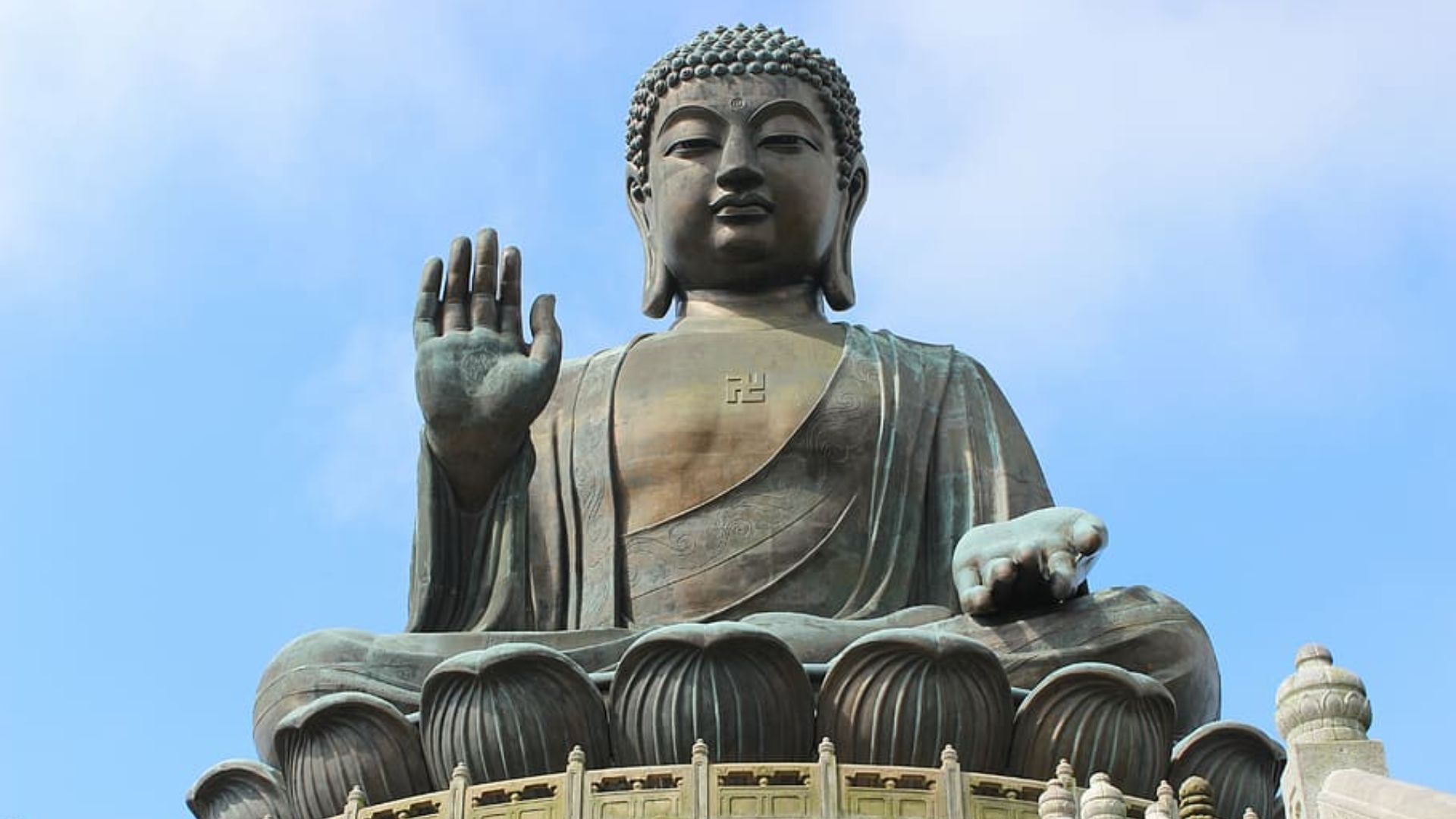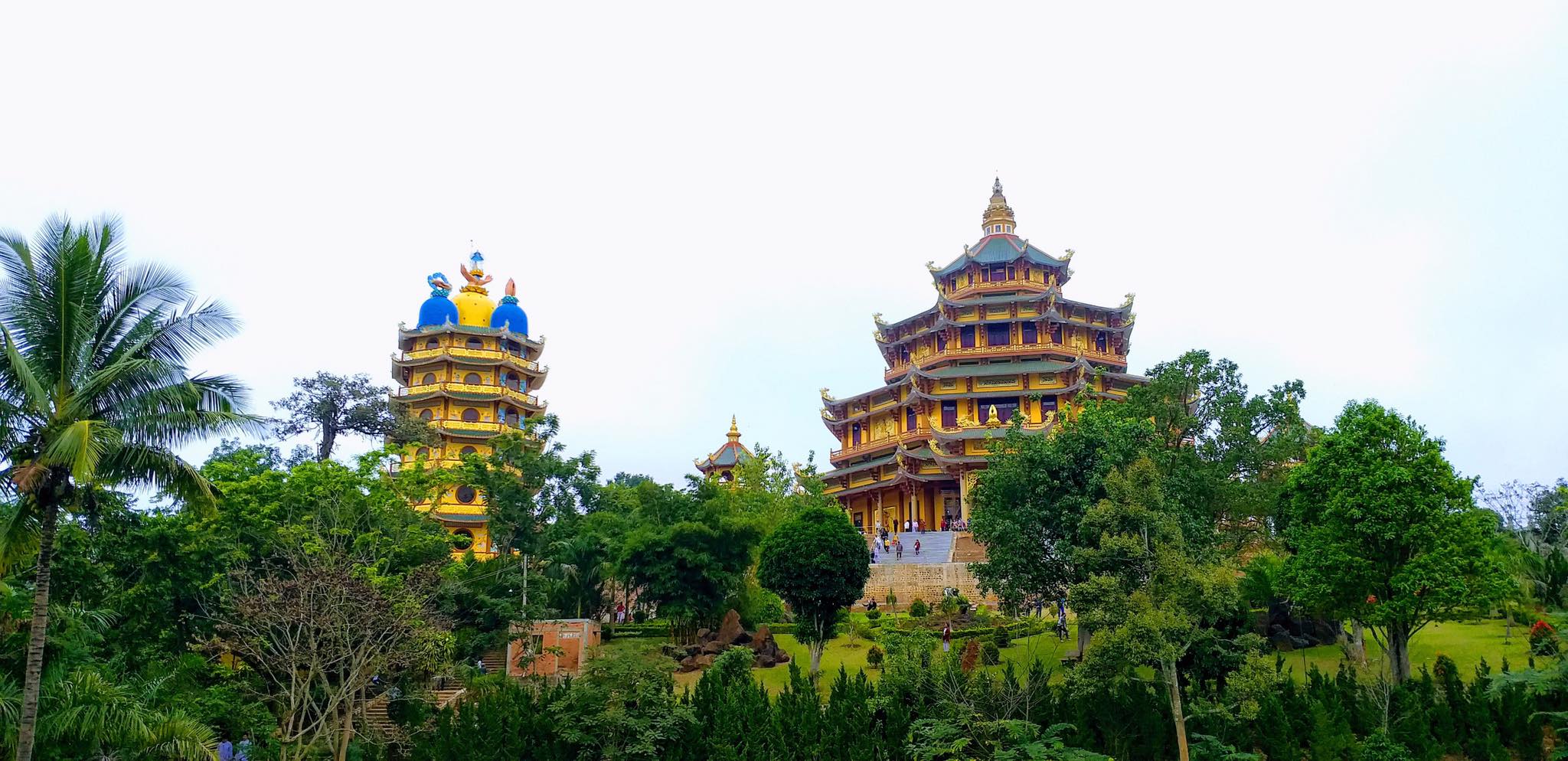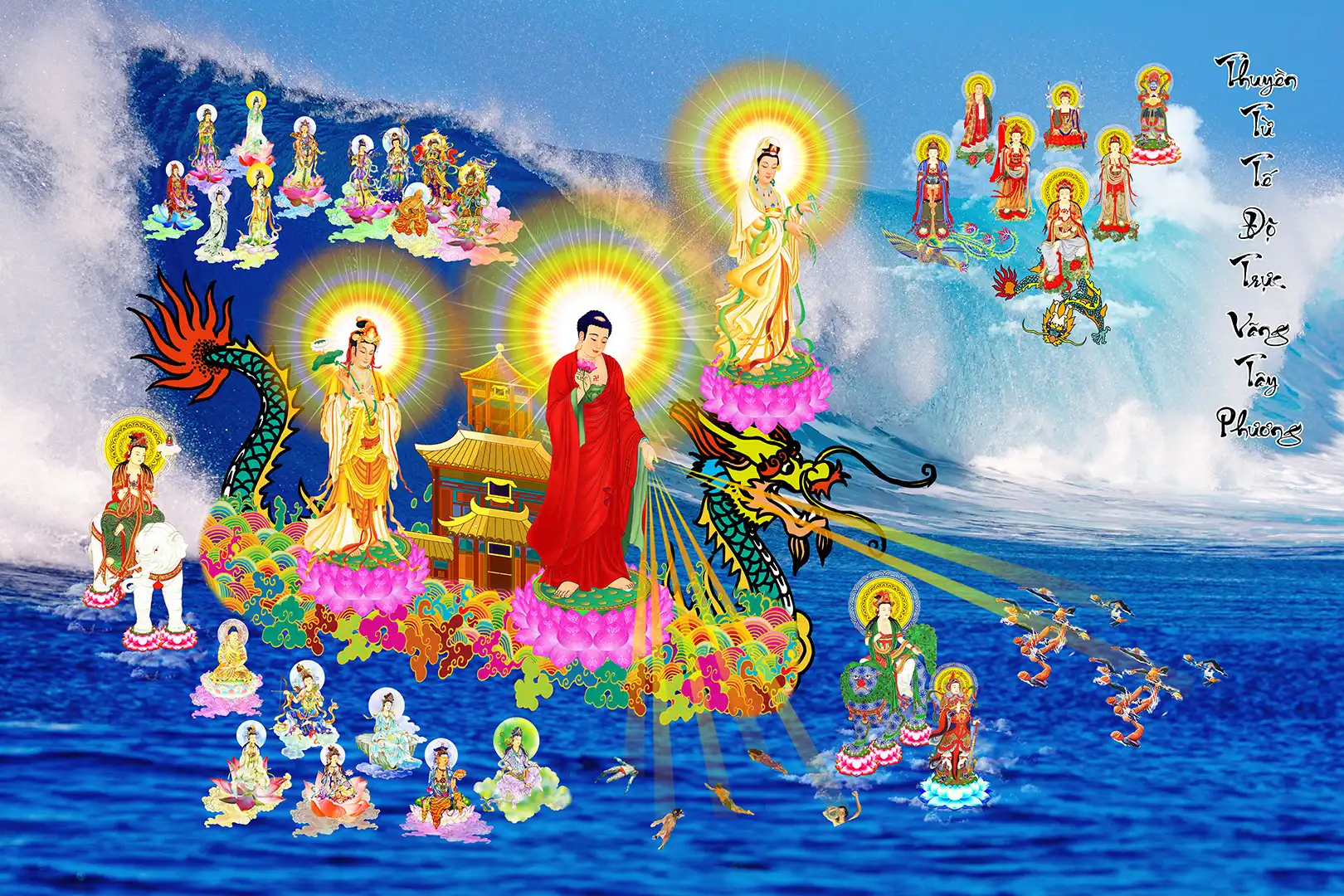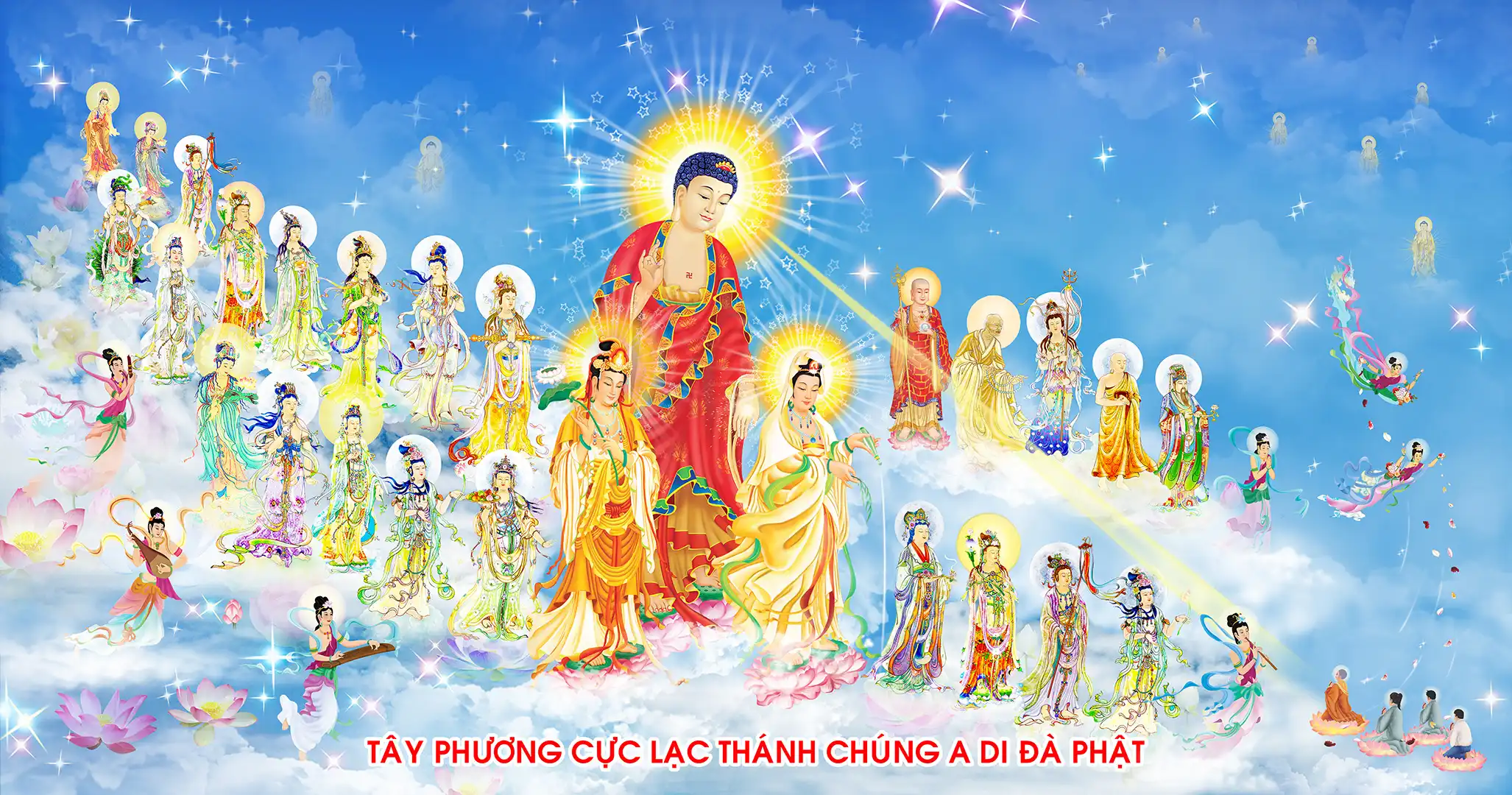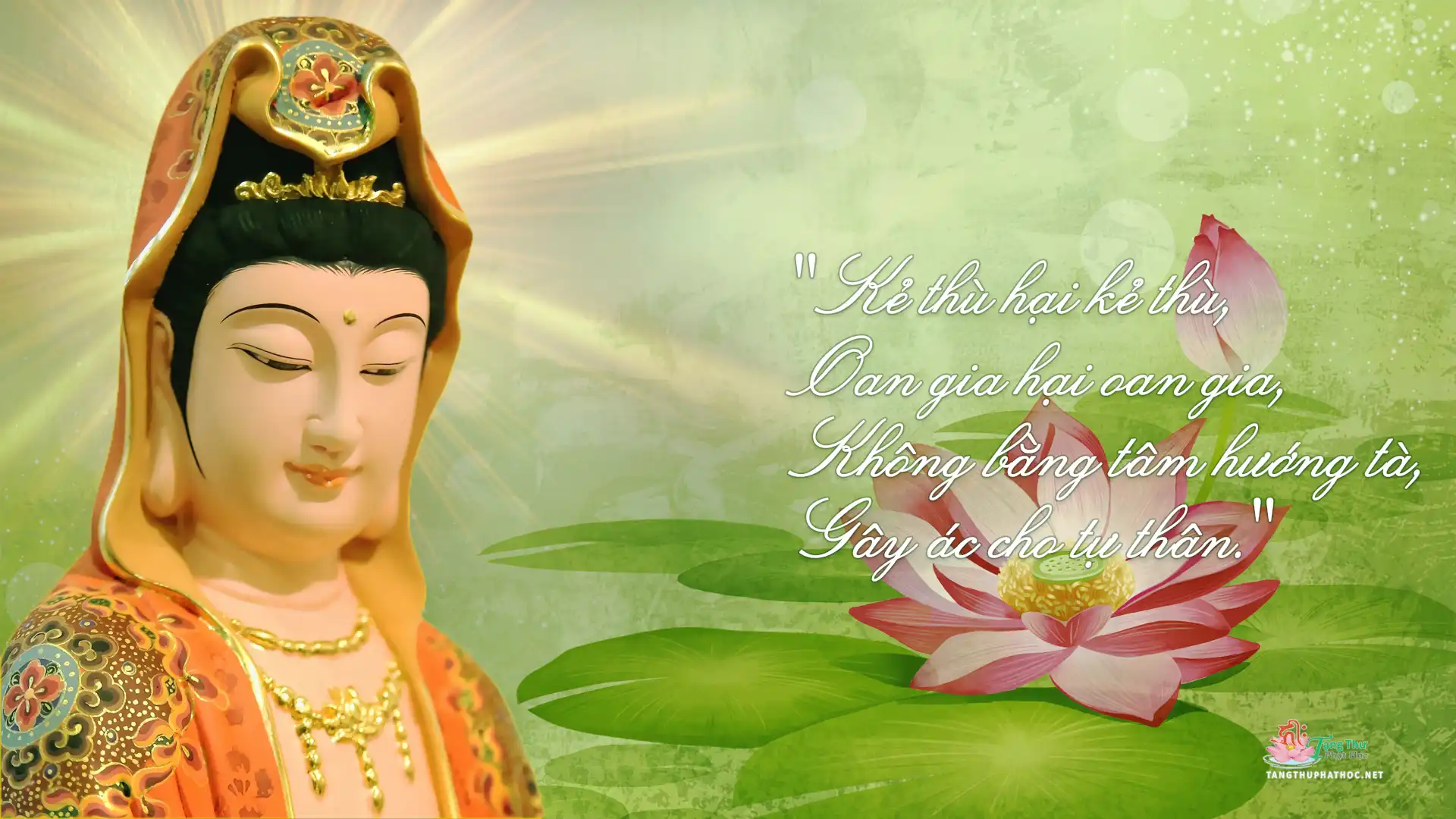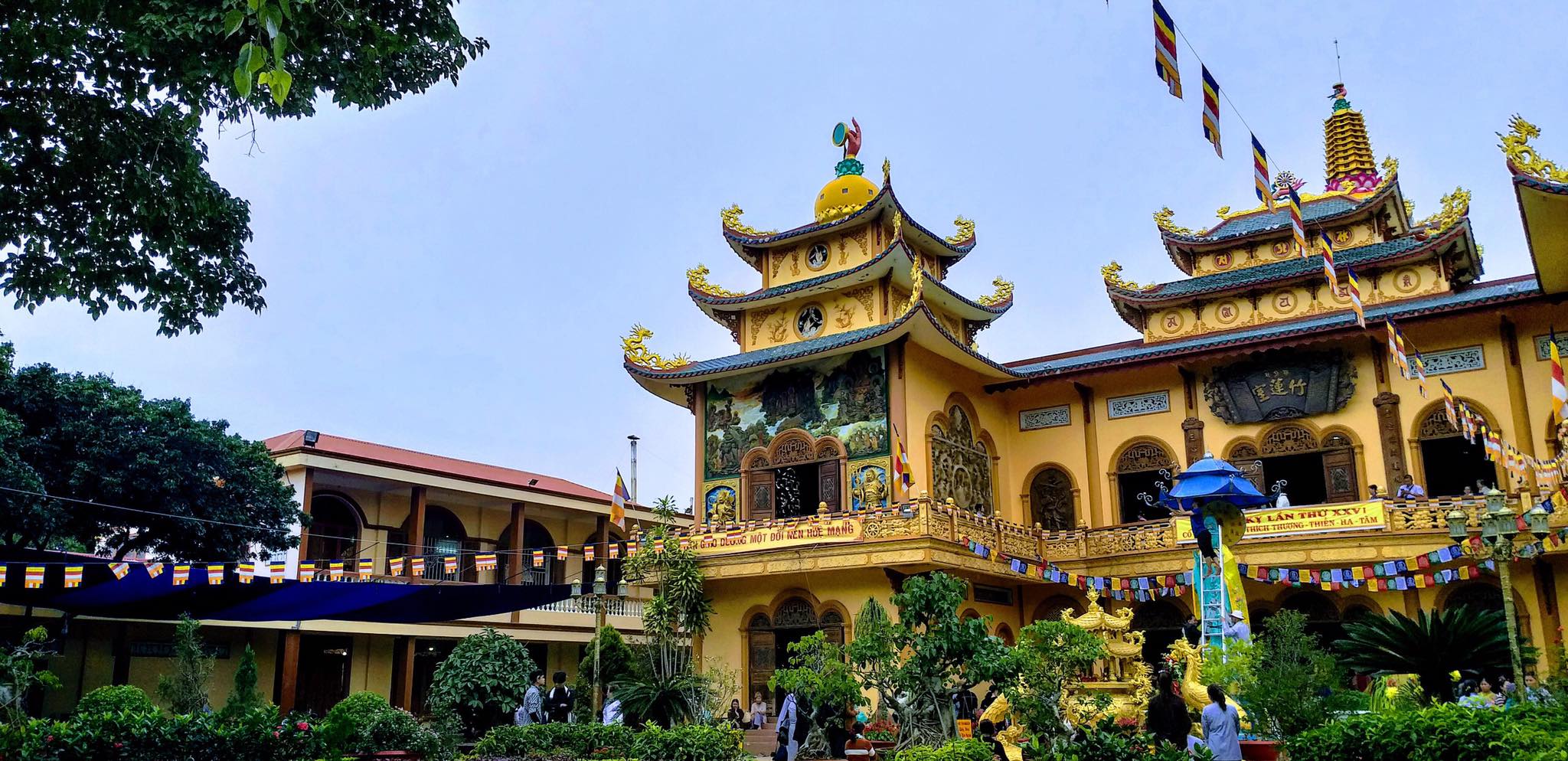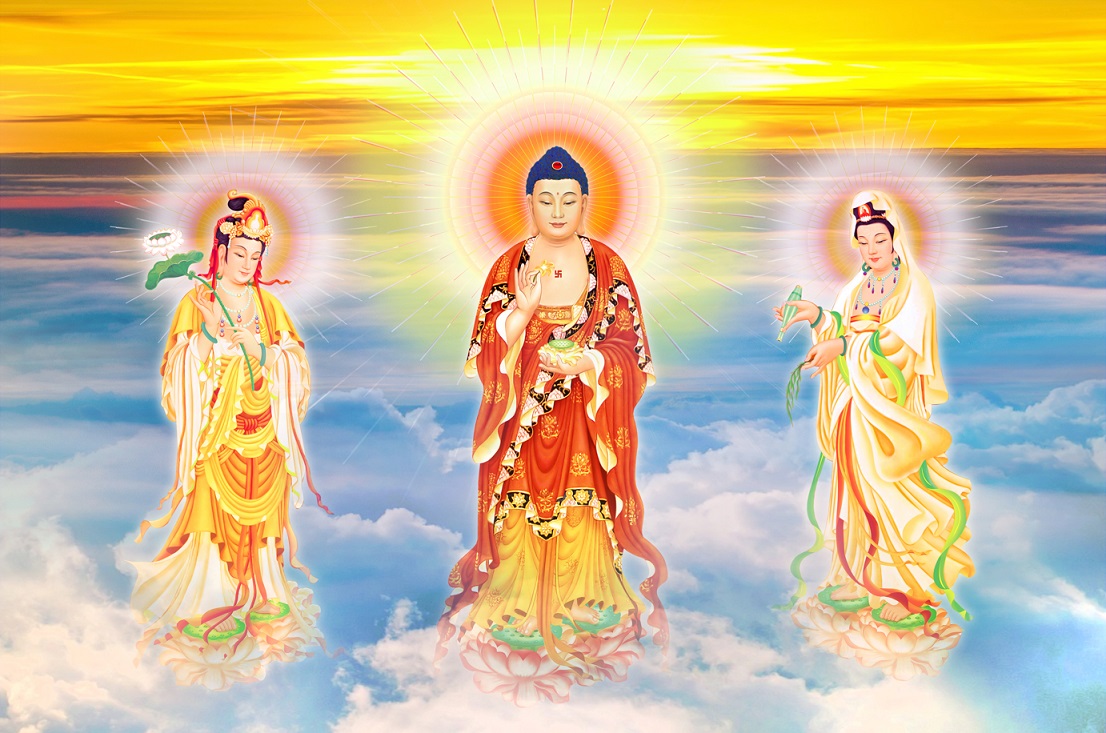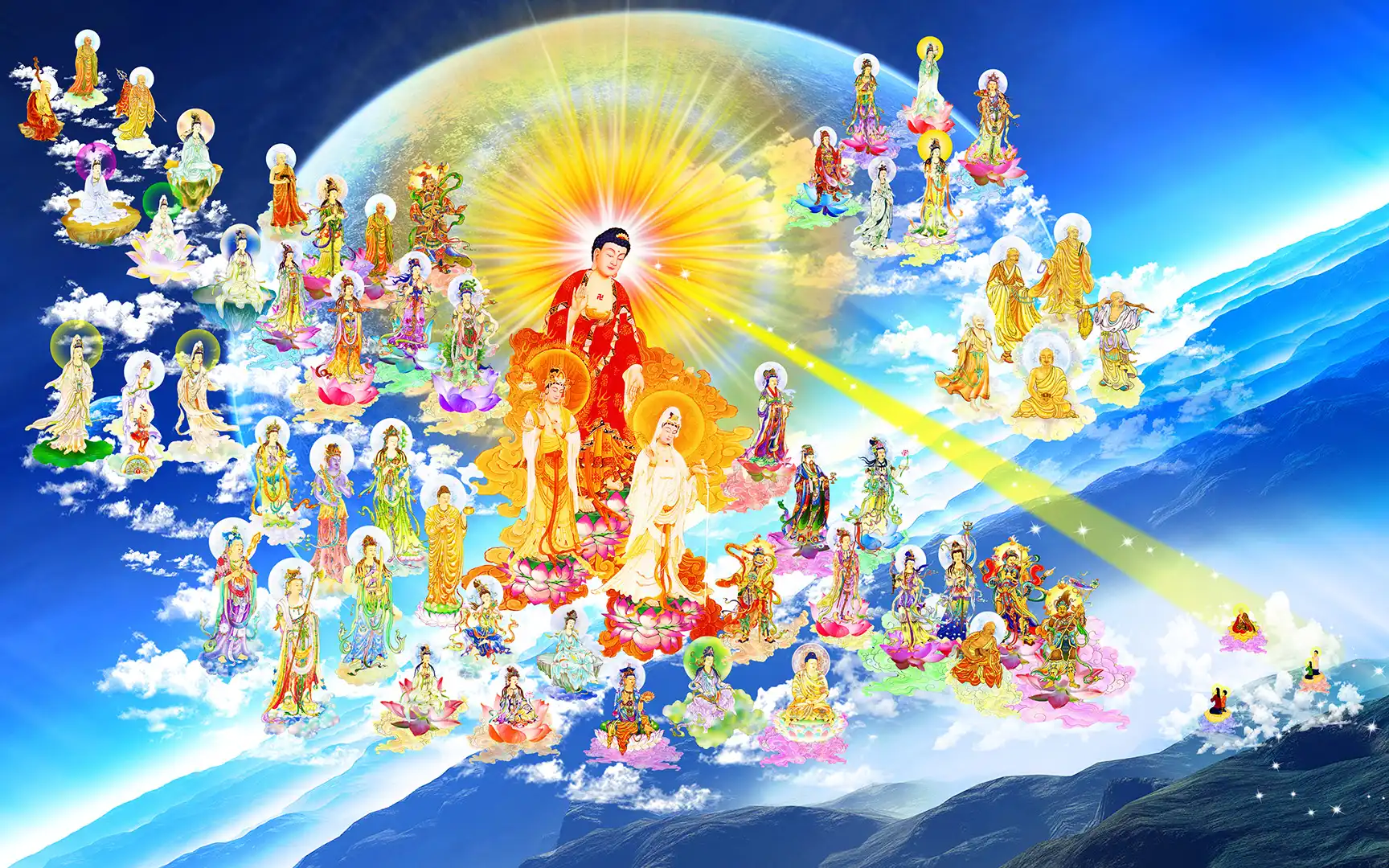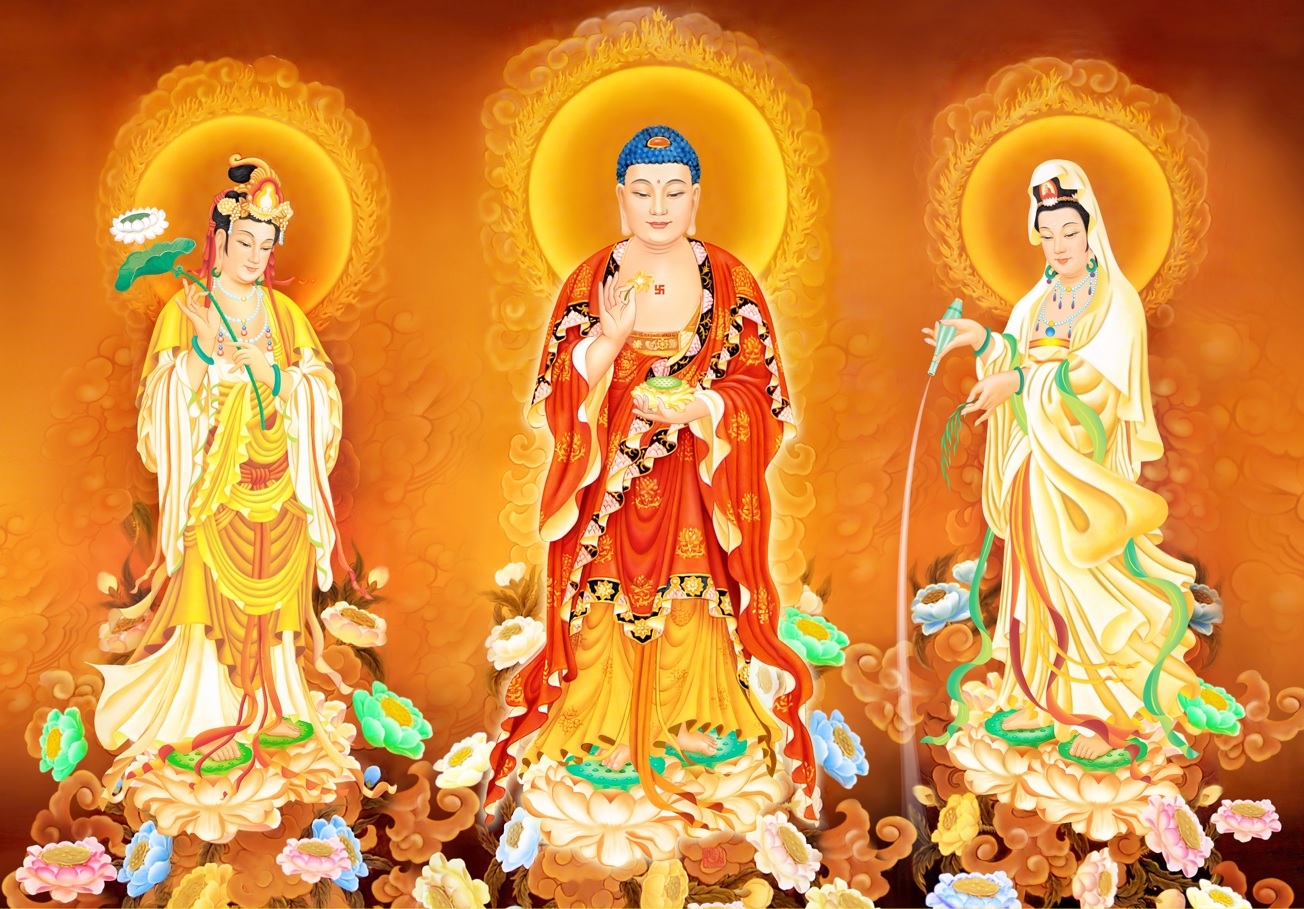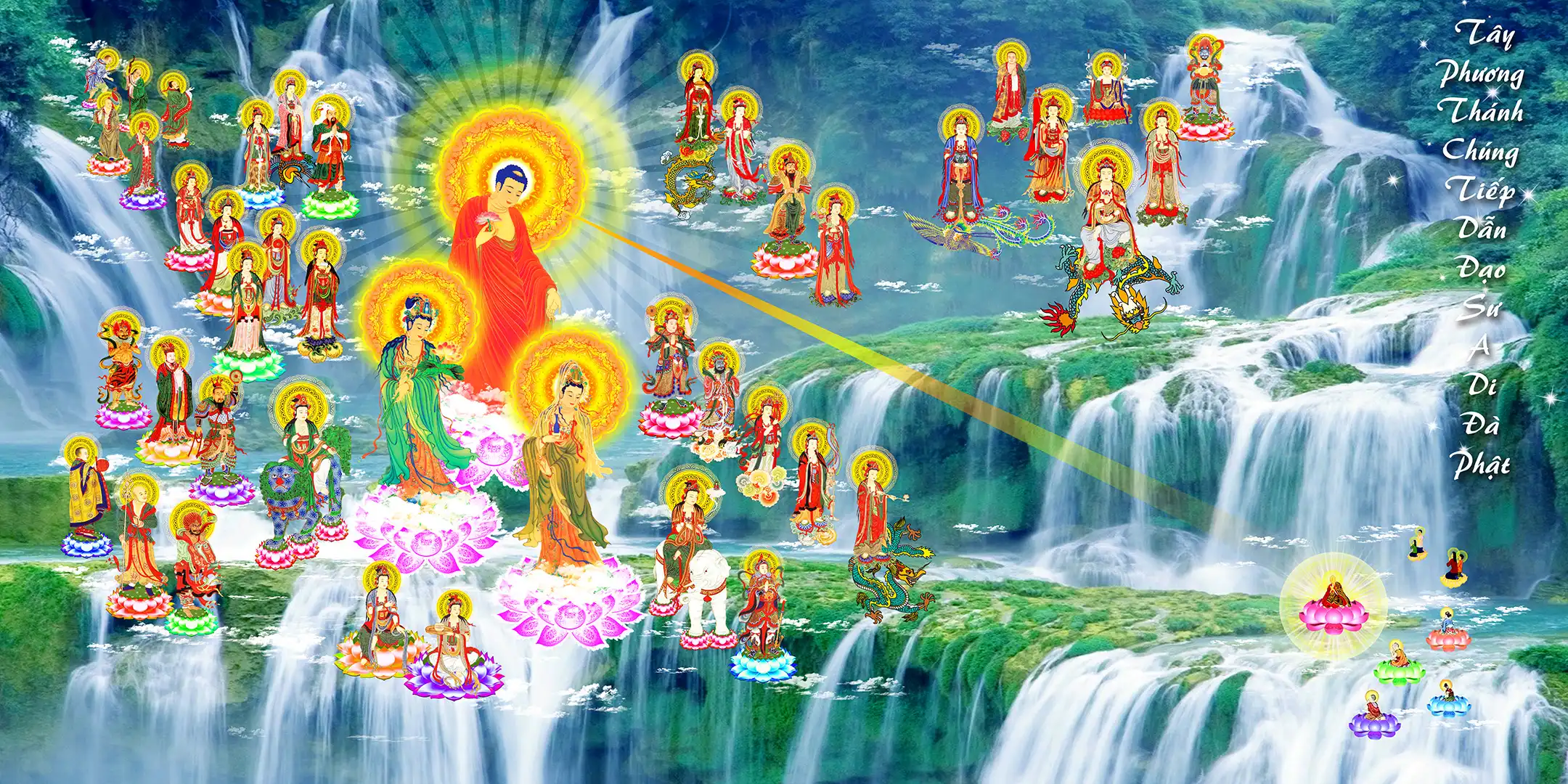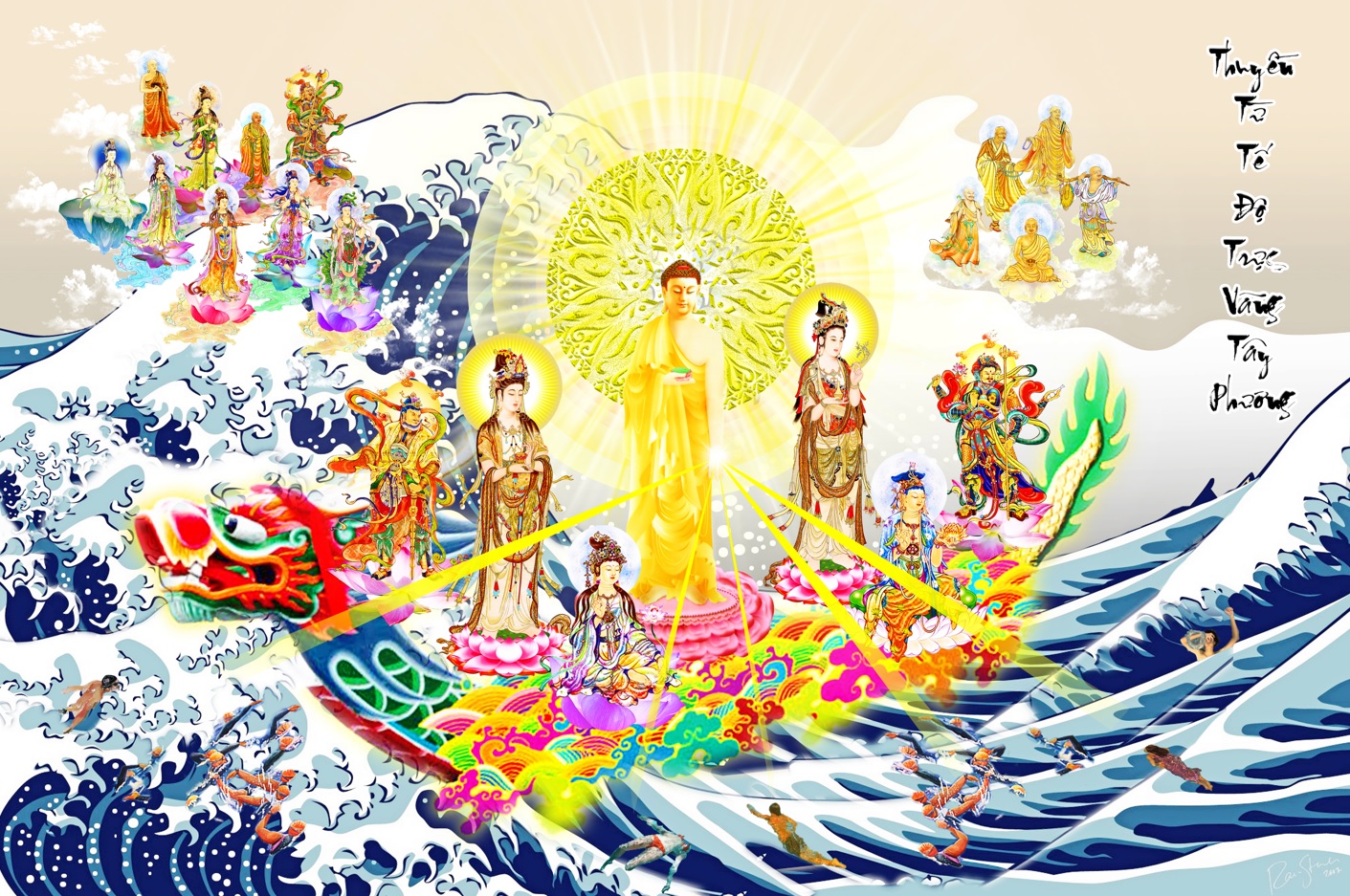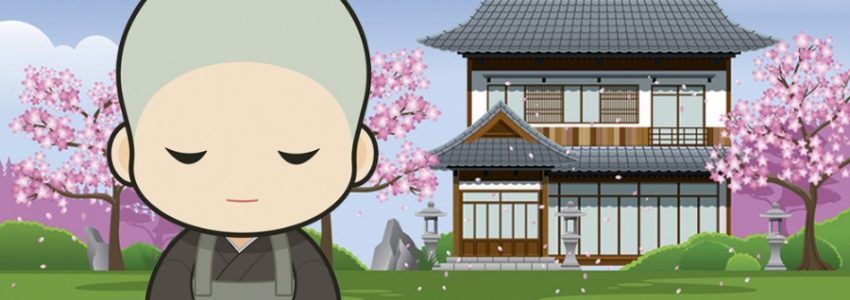THIỀN SƯ – ZEN MASTERS
THIỆN PHÚC
Tổ Đình Minh Đăng Quang Santa Ana Hoa Kỳ 2007
Lục Tổ Trung Hoa Six Patriarchs in China
Ông là con trai thứ ba của một vị vua miền Nam Ấn. Sau khi kế tục Tổ Bát Nhã Đa La, ông đã du hành bằng đường biển sang Tàu (502) và trở thành vị Tổ đầu tiên ở đây—He was the third son of a Southern Indian king. After having succeeded Master Prajnatara, he sailed to China ((502) and became the Buddhist Patriarch there. Bồ Đề Đạt Ma vốn là thái tử thứ ba của vua Kancipura Nam Ấn. Ông là một Tăng sĩ học giả uyên thâm người Ấn, thần huệ sáng thông, nghe đâu ngộ đó. Ngài vâng lời Thầy là Bát Nhã Đa La (Prajnatara) đến triều đình Trung quốc vào khoảng năm 520 sau Tây lịch, với mục đích phổ biến hệ thống triết học của ông—Bodhidharma was the third son of the King of Kancipura, South India. He was a deeply learned Indian Buddhist monk at that time. He was a man of wonderful intelligence, bright and far reaching; he thoroughly understood everything that he ever learned. He obeyed the instruction of his teacher, Prajnatara, Bodhidharma started for the East in China in 520 A.D., with the special purpose of propagating his system of philosophy.
• Vua Lương Võ Đế vời Tổ đến Nam Kinh để triều kiến. Vua hỏi: “Từ khi tức vị đến nay, trẫm đã cho tạo chùa, sao chép kinh điển và độ Tăng rất nhiều. Công đức như vậy lớn như thế nào?” “Không có công đức gì cả,” là câu trả lời. Tổ lại nói tiếp: “Tất cả những công việc ấy chỉ là những quả báo nhỏ của một cái thân hữu lậu, như bóng theo hình, tuy có mà không phải thật.” Võ Đế hỏi: “Vậy đúng nghĩa thế nào là công đức?” Bồ Đề Đạt Ma đáp: “Đó là sự thanh tịnh, giác ngộ, sự hoàn mãn, và thâm thúy. Công đức như thế không xây dựng bằng phương tiện thế gian.” Võ Đế lại hỏi: “Thế nào là Thánh Đế đệ nhất nghĩa? “Tổ trả lời: “Rỗng tuếch, không có Thánh Đế gì hết.” Vua lại hỏi tiếp: “Vậy ai đang diện kiến trẫm đây?” Tổ nói: “Không biết.” Võ Đế không hiểu Tổ muốn nói gì. Sau cuộc nói chuyện nổi tiếng với vua Hán Vũ Đế, Tổ đã vượt dòng Dương Tử và đến Lạc Dương, kinh đô của Bắc Ngụy.
Sau một thời gian ở đây, Tổ đến Ngũ Đài Sơn và trú tại Thiếu Lâm Tự, nơi đây ngài diện bích (ngồi xoay mặt vào tường) trong 9 năm trường—The Emperor Wu-Ti invited him to Nanking for an audience. The Emperor said: “Since my enthronement, I have built many monasteries, copied many holy writings and invested many priests and nuns. How great is the merit due to me?” “No merit at all,” was the answer. Bodhidharma added: “All these things are merely insignificant effects of an imperfect cause. It is the shadow following the substance and is without real entity.” The emperor asked: “Then , what is merit in the true sense of the word?” Bodhidharma replied: “It consists in purity and enlightenment, completeness and depth. Merit as such cannot be accumulated by worldly means.” The emperor asked again: “What is the Noble Truth in its highest sense?” Bodhidharma replied: “It is empty, no nobility whatever.” The emperor asked: “Who is it then that facing me?” Bodhidharma replied: “I do not know, Sire.” The Emperor could not understand him. Bodhidharma was famous for his interview with Emperor Han Wu Ti. But after that, Bodhidharma went away. He crossed the Yangtze River and reached the capital, Lo-Yang, of Northern Wei. After a sojourn there he went to Mount Wu-T’ai-Shan and resided in the Shao-Lin Temple where he meditated (facing the wall) for nine years in silence and departed.
• Qua cuộc đối thoại với Võ Đế, ta thấy rõ rằng cốt lõi chủ thuyết của Tổ Bồ Đề Đạt Ma là triết lý “Không Tánh” (sunyata), mà cái không thì không thể nào chứng minh được. Do đó, Bồ Đề Đạt Ma cũng đã đối đáp dưới hình thức phủ định. Khi nói về ảnh hưởng của đạo Phật trên đời sống và nền văn hóa của người Trung Hoa, chúng ta không thể không nói đến khuynh hướng bí hiểm nầy của triết lý Bồ Đề Đạt Ma, vì rõ ràng là khuynh hướng nầy đã tác động nhiều trên sự hình thành tinh thần Phật giáo Trung Hoa, và từ đó xuất hiện Phật giáo Thiền tông—As is clear from the dialogue between the emperor and Bodhidharma, the essential core of Bodhidharma’s doctrine is the philosophy of emptiness (sunyata), and sunyata is beyond demonstration of any kind. Therefore, Bodhidharma also replied in the negative form. When we speak of the Buddhistinfluence on the life and literature of the Chinese people, we should keep this mystic trend of Bodhidharma’s philosophy in mind, for there is no doubt that it has had a great deal to do with the moulding of the spirit of Chinese Zen Buddhism.
• Theo các sử gia thì Bồ Đề Đạt Ma bác bỏ việc đọc tụng kinh điển. Do đó hệ thống triết học của ông khiến cho các tu viện ít chú trọng về kiến thức mà thiên về trầm tư thiền định nhiều hơn. Theo Bồ Đề Đạt Ma, Phật tử nên để ý đến thiền, vì chỉ cần hành thiền là có thể đạt đến giác ngộ. Do đó ông chỉ dịch có mỗi quyển Đại Bát Niết Bàn Kinh Luận (Mahaparinirvana-sutra-sastra). Ông là vị tổ thứ 28 của dòng Thiền Ấn Độ và là sơ tổ của dòng Thiền Trung Quốc. Các học giả vẫn còn không đồng ý với nhau về việc Bồ Đề Đạt Ma đến Trung Hoa từ lúc nào, ở lại đó bao lâu, và mất vào lúc nào, nhưng nói chung giới Phật tử nhà Thiền chấp nhận rằng Bồ Đề Đạt Ma đến Nam Trung Hoa bằng thuyền vào khoảng năm 520 sau Tây Lịch, sau một nổ lực không kết quả để thiết lập giáo thuyết của mình tại đây, ông đã đến Lạc Dương thuộc miền bắc Trung Hoa, và cuối cùng ông định cư tại chùa Thiếu Lâm.
Ngài đã mang sang Trung Quốc một thông điệp thù thắng, được tóm gọn trong mười sáu chữ Hán sau đây, dù rằng người ta chỉ nhắc đến thông điệp nầy về sau thời Mã Tổ—According to historians, Bodhidharma denied canon reading, and his system therefore made the Buddhist monasteries much less intellectual and much more meditative than they were ever before. According to Bodhidharma, Buddhists should stress on meditation, because by which alone enlightenment can be attained. Bodhidharma was the 28th Indian (in line from the Buddha) and first Zen Patriarch in China. Scholars still disagree as to when Bodhidharma came to China from India, how long he stayed there, and when he died, but it is generally accepted by Zen Buddhists that he came by boat from India to southern China about the year 520 A.D., and after a short, fruitless attempt to establish his teaching there he went to Lo-Yang in northern China and finally settled in Shao-Lin Temple. Bodhidharma came to Chine with a special message which is summed in sixteen Chinese words, even though Zen masters only mentioned about this message after Ma-Tsu:
Bất lập văn tự
Giáo ngoại biệt truyền
Trực chỉ nhân tâm
Kiến tánh thành Phật.
“A special tranmission outside the scriptures;
No dependence upon words and letters
Direct pointing at the soul of man;
Seeing into one’s nature and the attainment of Buddhahood.”
• Tổ Bồ Đề Đạt Ma và môn đệ của ông, Huệ Khả, người mà tổ đã truyền pháp, luôn là đề tài của công án Thiền Vô Môn cũng như bức tranh nổi tiếng của Sesshu, một họa sĩ lừng danh của Nhật Bản. Huệ Khả, một học giả nổi tiếng thời bấy giờ, tìm đến Bồ Đề Đạt Ma lúc ông đang tọa thiền, phàn nàn với ông rằng mình không an tâm và làm thế nào để tâm được an. Bồ Đề Đạt Ma đuổi Huệ Khả đi, bảo rằng muốn đạt được an tâm phải tu lâu và khó nhọc không tự phụ và nản lòng. Sau khi đứng hàng giờ dưới tuyết, Huệ Khả bèn chặt đứt bàn tay trái của mình để dâng lên Bồ Đề Đạt Ma.
Bấy giờ tin chắc vào lòng chân thành và quyết tâm của Huệ Khả, Bồ Đề Đạt Ma nhận Huệ Khả làm môn đệ—Bodhidharma and Hui-K’e, his disciple to whom he had transmitted the Dharma, are always the subject of koan in the “No Gate Zen” as well as of a famous painting by Sesshu, Japan’s greatest painter. Hui-K’e, a scholar of some repute, complains to Bodhidharma, who is silently doing meditation, that he has no peace of mind and asks how he can acquire it. Bodhidhrma turns him away, saying that the attainment of inward peace involves long and hard disciple and is not for the conceited and fainthearted. Hui-K’e, who has been standing outside in the snow for hours, implores Bodhidharma to help him. Again he is rebuffed. In desperation he cuts off his left hand and offers it to Bodhidharma. Now convinced of his sincerity and determination, Bodhidharma accepts him as a disciple.
• Câu chuyện trên đây nhấn mạnh đến tầm quan trọng mà các thiền sư buộc vào kẻ khao khát sự an tâm vào việc tọa thiền, vào lòng chân thành và khiêm tốn, sự kiên nhẫn và nghị lực như là những tiên đề trong sự đạt thành đạo vô thượng. Vì thương kẻ tinh thành nên Tổ bèn chỉ cho chân đạo: “Bích quán là phép an tâm (see Bích Quán), tứ hạnh là phép phát hạnh (see Tứ Hạnh), phòng ngừa sự chê hiềm là phép thuận vật, và đừng chấp trước là phương tiện tu hành cũng như cứu độ chúng sanh.”—This story emphasizes the importance which Zen masters attach to the hunger for self-realization, to meditation, and to sincerity and humility, perserverance and fortitude as prerequisites to the attainment of the highest truth. He was moved by the spirit of sincerity of Hui-K’o, so he instructed him: “Meditating facing the wall is the way to obtain peace of mind, the four acts are the ways to behave in the world, the protection from slander and ill-disposition is the way to live harmoniously with the surroundings, and detachment is the upaya to cultivate and to save sentient beings.”
• Khi ở chùa Thiếu Lâm, Tổ thường dạy nhị tổ bằng bài kệ sau—When he lived at Shao-Lin temple, he always taught the second patriarch with this verse:
Ngoài dứt chư duyên
Trong không toan tính
Tâm như tường vách
Mới là nhập đạo
(Externally keep you away from all relationships, and, internaly, have no hankerings in your heart; when your mind is like unto a straight-standing wall you may enter into the Path).
Sau chín năm ở Thiếu Lâm, Tổ muốn trở về Thiên Trúc, bèn gọi môn nhân đến bảo: “Ngày ta lên đường sắp đến, các ngươi thử trình xem chỗ sở đắc của mỗi người về Đạo Thiền.” Bấy giờ ông Đạo Phó bạch: “Theo chỗ thấy của tôi, chẳng chấp văn tự, chẳng lìa văn tự, đó là chỗ sở dụng của đạo.” Tổ nói: “Ông được phần da của ta.” Ni Tổng Trì bạch: “Chỗ hiểu của tôi nay như Khánh Hỷ (A Nan) nhìn vào nước Phật A Súc (Bất Động Như Lai), thấy một lần không thấy lại được.” Tổ nói: “Bà được phần thịt của tôi.” Đạo Dục bạch: “Bố đại vốn không, năm ấm chẳng thật, chỗ thấy của tôi là không có gì sở đắc hết.” Tổ nói: “Ông được phần xương của tôi.” Sau cùng, Huệ Khả đến đảnh lễ Tổ, xong cứ thế mà đứng thẳng, chứ không nói gì. Tổ nói: “Ông được phần tủy của tôi.” Những ngày cuối cùng của Tổ Bồ Đề Đạt Ma ở Trung Quốc không ai biết rõ, sư đi đâu và thị tịch hồi nào.
Có người nói sư băng qua sa mạc trở về Ấn Độ, cũng có người nói sư qua Nhật—After nine years at Shao-Lin temple, the Patriarch wished to return to India. He called in all his disciples before him, and said: “The time is come for me to depart, and I want to see what your attainments are.” Tao-Fu said: “According to my view, the truth is above affirmation and negation, for this is the way it moved.” The Patriarch said: “You have got my skin.” Then Nun Tsung-Ch’ih said: “As I understand it, it is like Ananda’s viewing the Buddhaland of Akshobhya Buddha: it is seen once and never again.” The Patriarch said: “You have got my flesh.” Tao-Yu said: “Empty are the four elements and non-existent the five skandhas. According to my view, there is not a thing to be grasped as real.” The Patriarch said: “You have got my bone.” Finally, Hui-K’o reverently bowed to the master, then kept standing in his place and said nothing. The Patriarch said: “You have my marrow.” Nobody knows his whereabout and when he passed away. Some people say that he crossed the desert and went to India, and others say that he crossed the sea to go to Japan.
2. Huệ Khả: Theo Truyền Đăng Lục, Huệ Khả (487-593) là một nhà nho nhiệt tâm, một mẫu người tánh tình phóng khoáng, rộng rãi, dù đã quen với sách Nho Lão, nhưng luôn luôn không hài lòng với những thuyết ấy vì ngài thấy chúng chưa được thấu đáo. Khi nghe tin Bồ Đề Đạt Ma từ Ấn sang, ngài tìm đến gặp Tổ Bồ Đề Đạt Ma ở Thiếu Lâm Tử để hỏi pháp. Khi đến cầu đạo với tổ Đạt Ma, nhưng thầy cứ ngồi im lặng quay mặt vào vách. Huệ Khả suy nghĩ: “Người xưa cầu đạo đến phải chẻ xương lấy tủy, đổ máu nuôi người đói, xỏa tóc phủ đường lầy, hay đến cả gieo mình vào miệng cọp đói. Còn ta là kẻ nào? Ta há không thể hiến mình để phụng thờ chánh pháp hay sao?” vào ngày mồng chín tháng chạp cùng năm, vì muốn làm cho tổ có ấn tượng sâu đậm, ông đã đứng trong tuyết lạnh, rồi quỳ gối trong sân phủ đầy tuyết trong nhiều ngày.
Bấy giờ Tổ Bồ Đề Đạt Ma động lòng thương xót bèn hỏi: “Nhà ngươi muốn gì mà đứng mãi trong tuyết như thế?” Huệ Khả đáp: “Tôi đến để mong được lời dạy vô giá của thầy; ngưỡng mong thầy mở cửa từ bi duỗi tay tế độ quần sanh đau khổ nầy.” Tổ bảo: “Giáo lý vô thượng của Phật chỉ có thể hiểu khi đã trải qua một thời gian dài cần khổ, nhẫn cái khó nhẫn, hành cái khó hành. Những người trí và đức thấp kém mà lòng thì khinh mạn, đâu có thể ghé mắt trông vào chân thừa của đạo Phật; chỉ luống công mà thôi.” Huệ Khả bị xúc cảm sâu xa, và cuối cùng để chứng tỏ tấm lòng thành khẩn mong được học hỏi đạo lý của chư Phật, ngài đã dùng dao chặt đứt cánh tay trái của mình dâng lên Tổ để được nhận làm đệ tử. Sau khi được Tổ Bồ Đề Đạt Ma nhận làm đệ tử. Tổ nhận xét: “Đừng đi tìm cái chân lý nầy ở kẻ khác.” Sau khi được Tổ nhận làm đệ tử, Huệ Khả hỏi Tổ: “Tâm con không an, xin Hòa Thượng dạy pháp an tâm.” Tổ nhìn thẳng bảo: “Đem tâm ra ta an cho.” Huệ Khả xoay tìm lại tâm mình, không thấy bóng dáng, bèn thưa với Tổ: “Con tìm tâm không được.” Tổ bảo: “Đừng lo, ta đã an tâm cho ngươi rồi.” Qua đó Huệ Khả liền ngộ.
Huệ Khả trình bày đủ cách hiểu của ông về tánh lý của tâm, nhưng lần nào Tổ cũng một mực bảo ‘chẳng phải,’ mà cũng không bảo nói gì về tâm thể vô niệm. Một hôm Huệ Khả nói: “Ta đã dứt hết chư duyên rồi.” Tổ hỏi: “Ngươi không biến thành hư vô đoạn diệt chứ?” Huệ Khả đáp: “Chẳng thành đoạn diệt.” Tổ lại hỏi: “Lấy gì làm tin chẳng phải là đoạn diệt?” Huệ Khả đáp: “Do cái biết tự nhiên vậy, còn nói thì chẳng được.” Tổ nói: “Đó là chỗ bí quyết tâm truyền của chư Phật, ngươi chớ ngờ gì hết.” Cuối cùng Huệ Khả được truyền y bát làm Nhị Tổ Thiền Tông Trung Hoa kế nghiệp tổ Bồ Đề Đạt Ma. Sau ngày từ giả Tổ cất bước du phương, sư không hoằng hóa ngay, mà tạm lánh ẩn giữa lớp hạ lưu cùng khổ, không để lộ chân tướng một cao Tăng trang nghiêm trí huệ. Dầu vậy, sư vẫn tùy duyên hóa độ. Sư luôn giữ vẻ điềm đạm khiêm cung, chứ không phô trương ra bề ngoài.
Ngày kia, trong khi sư đang nói pháp ngoài cửa tam quan chùa Khuôn Cứu thì trong chùa vị trụ trì học cao danh vọng là pháp sư Biện Hòa đang giảng kinh Niết Bàn. Bổn đạo ùn ùn bỏ vị pháp sư đứng giảng một mình để ra bu quanh ông thầy đang giảng giữa trời. Chắc là lúc ấy quần áo của sư bê bối lắm, tuyệt không có gì tỏ ra sư thuộc hàng giáo phẩm. Pháp sư thấy vậy nổi giận, đến đầu cáo với quan trên về ông đạo ăn mày kia truyền tà giáo. Do đó Huệ Khả bị bắt, và bị xử giảo. Ngài không hề kêu oan, mà ngược lại cứ một mực bình thản thuận theo, cho rằng đúng với luật nhân quả rằng sư có một món nợ cũ cần phải trả.
Nội vụ xãy ra trong năm 593, sư thọ 107 tuổi—According to the Transmission of the Lamp, Hui-K’o (487-593), a strong-minded Confucian scholar, a liberated minded, open-hearted kind of person. He thoroughly acquainted with Confucian and Taosit literature, but always dissatisfied with their teachings because they appeared to him not quite thorough-going. When he heard of Bodhidharma coming from India, he came to Bodhidharma and asked for instruction at Sha-Lin Temple, when arrived to seek the dharma with Bodhidharma, but the master was always found sitting silently facing the wall. Hui-K’o wondered to himself: “History gives examples of ancient truth-seekers, who were willing for the sake of enlightenment to have the marrow extracted from their bones, their blood spilled to feed the hungry, to cover the muddy road with their hair, or to throw themselves into the mouth of a hungry tiger. What am I? Am I not also able to give myself up on the altar of truth?” On the ninth of December of the same year, to impress Bodhidharma, he stood still under the snow, then knelt down in the snow-covered courtyard for many days. Bodhidharma then took pity on him and said: “You have been standing in the snow for some time, and what is your wish?” Hui-K’o replied: “I come to receive your invaluable instruction; please open the gate of mercy and extend your hand of salvation to this poor suffering mortal.”
Bodhidharma then said: “The incomparable teaching of the Buddha can be comprehended only after a long and hard discipline and by enduring what is most difficult to endure and practising what is most difficult to practise. Men of inferior virtue and wisdom who are light-hearted and full of self-conceit are not able even to set their eyes on the truth of Buddhism. All the labor of such men is sure to come to naught.” Hui-K’o was deeply moved and in order to show his sincerity in the desire to be instructed in the teaching of all the Buddhas, he finally cut off his left arm in appeal to be received as disciple. Until he seemd to be well prepared, Bodhidharma call him in and asked: “What do you wish to learn?” Hui-K’o replied: “My mind is always disturbed. I request your honor that I could be taught a way to pacify it.” Bodhidharma then ordered: “Bring me your troubled mind and I will calm it down for you.” Hui-K’o replied: “But Honorable Master, I could not locate it.” Bodhidharma then said: “Don’t worry, disciple. I have appeased your mind for you already.” With that short encounter, Hui-K’o immediately became enlightened.
Hui-K’o tried so many times to explain the reason of mind, but failed to realize the truth itself. The Patriarch simple said: “No! No! And never proposed to explain to his disciple what was the mind-essence in its thought-less state. One day, Hui-K’o said: “I know now how to keep myself away from all relationships.” The Patriarch queried: “You make it total annihilation, do you not?” Hui-K’o replied: “No, master, I do not make it a total annihilation.” The Patriarch asked: “How do you testify your statement?” Hui-K’o said: “For I know it always in a most intelligible manner, but to express it in words, that is impossible.” The Patriarch said: “That is the mind-essence itself transmitted by all the Buddhas. Habour no doubts about it.” Eventually Hui-K’o received the teaching directly “mind-to-mind.” Subsequently, he inherited his robe and alms-bowl to become the Second Patriarch of the Chinese Zen Sect (the successor of Bodhidharma).
After he left the master, he did not at once begin his preaching, hiding himself among people of lower classes of society. He evidently shunned being looked up as a high priest of great wisdom and understanding. However, he did not neglect quietly preaching the Law whenever he had an occasion. He was simply quiet and unassuming, refusing to show himself off. But one day when he was discoursing about the Law before a three-entrance gate of a temple, there was another sermon going on inside the temple by a resident priest, learned and honoured. The audience, however, left the reverend lecturer inside and gathered around the street-monk, probably clad in rags and with no outward signs of ecclesiastical dignity. The high priest got angry over the situation. He accused the beggar-monk to the authorities as promulgating a false doctrine, whereupon Hui-K’o was arrested and put to death. He did not specially plead innocent but composedly submitted, saying that he had according to the law of karma an old debt to pay up. This took place in 593 A.D. and he was one hundred and seven years old when he was killed.
3. Tăng Xán: Seng-Ts’an (?-606)—Vị Tổ thứ ba của Thiền Tông Trung Hoa—The Third Patriarch of the Chinese Zen Sect—Theo Truyền Đăng Lục, thì lúc Tăng Xán tìm đến Tổ Huệ Khả, ngài đã là một cư sĩ tuổi đã ngoài bốn mươi tuổi. Ngài đến đảnh lễ Thiền sư Huệ Khả, thưa: “Đệ tử mắc chứng phong dạng, thỉnh Hòa Thượng từ bi sám hối tội dùm!” Tổ Huệ Khả nói: “Đưa cái tội ra đây ta sám cho.” Hồi lâu cư sĩ thưa: “Đệ tử kiếm tội mãi chẳng thấy đâu cả.” Tổ nói: “Thế là ta đã sám xong tội của ngươi rồi đó. Từ nay, ngươi khá y nơi Phật Pháp Tăng mà an trụ.” Cư sĩ thưa: “Nay tôi thấy Hòa Thượng thì biết đó là Tăng, nhưng chưa rõ thế nào là Phật và Pháp.” Tổ nói: “Là Tâm là Phật, là Tâm là Pháp, Pháp và Phật chẳng hai, Tăng bảo cũng y như vậy.” Cư sĩ thưa: “Nay tôi mới biết tội tánh chẳng ở trong, chẳng ở ngoài, chẳng ở giữa; cũng như tâm, Phật là vậy, Pháp là vậy, chẳng phải hai vậy.”
Cư sĩ được Tổ Huệ Khả thế phát, sau đó biệt dạng mất trong đời, ít ai rõ được hành tung. Một phần do nạn ngược đãi Phật giáo dưới thời Bắc Châu, do vua Lương Võ Đế chủ xướng. Đến năm thứ 12 đời Khai Hoàng nhà Tùy, Tăng Xán tìm được bậc pháp khí để truyền ngôi Tổ vị, đó là Đạo Tín. Sau đó Tăng Xán đi đâu không ai biết; tuy nhiên, người ta nói ngài thị tịch khoảng năm 606 sau Tây Lịch—According to The Transmission of the Lamp Records, when Seng-Ts’an came to see Hui-K’o he as a lay man of forty years old. He came and bowed before Hui-K’o and asked: “I am suffering from feng-yang, please cleanse me of my sins.” The Patriarch said: “Bring your sins here and I will cleanse you of them.” He was silent for a while but finally said: “As I seek my sins, I find them unattainable.” The Patriarch said: “I have then finished cleansing you altogether.
From now on, you should take refuge and abide in the Buddha, Dharma, and Sangha.” Seng-Ts’an said: “As I stand before you, O master, I know that you belong to the Sangha, but please tell me what are the Buddha and the Dharma?” The Patriarch replied: “Mind is the Buddha, Mind is the Dharma; and the Buddha and the Dharma are not two. The same is to be said of the Sangha (Brotherhood). This satisfied the disciple, who now said: “Today for the first time I realize that sins are neither within nor without nor in the middle; just as Mind is, so is the Buddha, so is the Dharma; they are not two.” He was then ordained by Hui-K’o as a Buddhist monk, and after this he fled from the world altogether, and nothing much of his life is known. This was partly due to the persecution of Buddhism carried on by the Emperor of the Chou dynasty. It was in the twelfth year of K’ai-Huang, of the Sui dynasty (592 A.D.), that he found a disciple worthy to be his successor. His name was Tao-Hsin. His whereabout was unknown; however, people said that he passed away around 606 A.D.—For more information, please see Tín Minh Tâm.
Tín Minh Tâm: Theo Thiền sư D.T. Suzuki trong Thiền Luận, Tập I, Tổ Tăng Xán hầu như sống ẩn dật suốt đời, nhưng ta có thể nhìn ra tư tưởng của Tổ qua một thi phẩm luận về lòng tin có tên là Tín Minh Tâm. Đây là một trong những bút tích của các Thiền sư góp phần xứng đáng nhất vào sự luận giải tông chỉ nhà Thiền—According to Zen master D.T. Suzuki in the Essays in Zen Buddhism, Book I, the third patriarch lived most of his life as a hermit (obscure), his thought is gleaned from a metrical composition known as Hsin-Hsin-Ming or ‘Inscribed on the Believing Mind’.
Đạo lớn chẳng gì khó,
cốt đừng chọn lựa thôi.
Quí hồ không thương ghét,
tự nhiên ngời sáng.
(Chí đạo vô nan, duy hiềm giản trạch.
Đản mạc tắng ái, đồng nhiên minh bạch).
The Perfect Way knows no dificulties
Except that it refuses to make preference:
Only when freed from hate and love,
It reveals itself fully and without disguise.
Sai lạc nửa đường tơ,
đất trời liền phân cách.
Chớ nghĩ chuyện ngược xuôi,
thì hiện liền trước mắt
(Hào li hữu sai, Thiên địa huyền cách.
Dục đắc hiện tiền, Mạc tồn thuận nghịch).
A tenth of an inch’s difference,
And heaven and earth are set apart:
If you want to see it manifest,
Take no thought either for or against it.
Đem thuận nghịch chỏi nhau,
Đó chính là tâm bịnh.
Chẳng nắm được mối huyền,
Hoài công lo niệm tịnh.
(Vi thuận nghịch tương tranh, thị vi tâm bịnh
Bất thức huyền chỉ, đồ lao niệm tịnh).
To set up what you like
against what you dislike.
This is the disease of the mind:
When the deep meaning of the Way
Is not understood.
Peace of mind is disturbed
and nothing is gained.
Tròn đầy tự thái hư,
Không thiếu cũng không dư.
Bởi mãi lo giữ bỏ,
Nên chẳng được như như.
(Viên đồng thái hư, vô khiếm vô dư
Lương do thủ xả, sở dĩ bất như).
The Way is perfect like unto vast space,
With nothing wanting, nothing superfluous:
It is indeed due to making choice
That its suchness is lost sight of.
Ngoài chớ đuổi duyên trần,
Trong đừng ghì không nhẫn.
Cứ một mực bình tâm,
Thì tự nhiên dứt tận.
(Mạc trục hữu duyên, vật trụ không nhẫn
Nhứt chủng bình hoài, dẫn nhiên tự tận).
Pursue not the outer entanglements,
Dwell not in the inner void;
When the mind rests serene
In the oneness of things,
The dualism vanishes by itself.
Ngăn động mà cầu tịnh,
Hết ngăn lại động thêm.
Càng trệ ở hai bên,
Thà rõ đâu là mối.
(Chỉ động qui chỉ, chỉ cánh di động
Duy trệ lưỡng biên, minh tri nhứt chủng).
Đầu mối chẳng rõ thông
Hai đầu luống uổng công.
Đuổi có liền mất có
Theo không lại phụ không.
(Nhứt chủng bất thông, lưỡng xứ thất công
Khiển hữu một hữu, tòng không bối không)
And when oneness is not thoroughly understood,
In two ways loss is sustained.
The denial of reality may lead to its absolute negation,
While the upholding of the void may result in contradicting itself.
Nói nhiều thêm lo quẩn,
Loanh quanh mãi chẳng xong.
Dứt lời dứt lo quẩn,
Đâu đâu chẳng suốt thông.
(Đa ngôn đa lự, chuyển bất tương ưng
Tuyệt ngôn tuyệt lự, vô xứ bất thông).
Wordiness and intellection
The more with them the further astray we go
away; therefore, with wordiness and intellection, there is no place where we cannot pass freely.
Trở về nguồn nắm mối
Dõi theo ngọn mất tông
Phút giây soi ngược lại
Trước mắt vượt cảnh không.
(Qui căn đắc chỉ, tùy chiếu thất tông
Tu du phản chiếu, thắng khước tiền không).
When we return to the root, we gain the meaning.
When we pursue the external objects, we lose the reason.
The moment we are enlightened within;
we go beyond the voidness of a world confronting us.
Cảnh không trò thiên diễn
Thảy đều do vọng kiến
Cứ gì phải cầu chơn
Chỉ cần dứt sở kiến
(Tiền không chuyển biến, giai do vọng kiến
Bất dụng cầu chơn, duy tu tức kiến).
Transformations going on in an empty world which confronts us.
Appear real all because of ignorance:
Try not to seek after the true,
only cease to cherish opinions.
Hai bên đừng ghé mắt
Cẩn thận chớ đuổi tầm
Phải trái vừa vướng mắc
Là nghiền đốt mất tâm.
(Nhị kiến bất trụ, thận vật truy tầm
Tài hữu thị phi, phấn nhiên thất tâm).
Tarry not with dualism, carefully avoid pursuing it;
as soon as you have right or wrong,
confusion ensues, the mind is lost.
Hai do một mà có
Một rồi cũng buông bỏ
Một tâm ví chẳng sanh
Muôn pháp tội gì đó.
(Nhị do nhứt hữu, nhứt diệc mạc thủ
Nhứt tâm bất sinh, vạn pháp vô cữu).
The two exists because of the one,
but hold not even to this one;
when the one mind is not disturbed,
the ten thousand things offer no offence.
Không tội thì không pháp
Chẳng sanh thì chẳng tâm
Tâm theo cảnh mà bặt
Cảnh theo tâm mà chìm.
(Vô cữu vô pháp, bất sanh bất tâm
Năng tùy cảnh diệt, cảnh trục năng trầm).
When no offence is offered by them,
they are as if not existing;
when the mind is not disturbed,
it is as if there is no mind.
The subject is quieted as the object ceases,
the object ceases as the subject is quieted.
Tâm là tâm của cảnh
Cảnh là cảnh của tâm
Vì biết hai đằng dứt
Rốt cùng chỉ một không.
(Cảnh do năng cảnh, năng do cảnh năng
Dục tri lưỡng đoạn, nguyên thị nhứt không)
The object is an object for the subject,
the subject is a subject for an object:
Know that the relativity of the two;
rests ultimately on the oneness of the void.
Một không, hai mà một
Bao gồm hết muôn sai
Chẳng thấy trong thấy đục
Lấy gì mà lệch sai.
(Nhứt không đồng lưỡng, tề hàm vạn tượng
Bất kiến tinh thô, ninh hữu thiên đảng).
In the oneness of the void the two are one,
And each of the two contains in itself all the ten thousand things:
When no discrimination is made between this and that,
how can one-sided and prejudiced view arise?
Đạo lớn thể khoan dung
Không dễ mà không khó
Kẻ tiểu kiến lừng khừng
Gấp theo và chậm bỏ.
(Đại đạo thể khoan, vô dị vô nan
Tiểu kiến hồ nghi, chuyển cấp chuyên trì).
The Great Way is calm and large-minded,
Nothing is easy, nothing is hard:
Small views are irresolute,
The more in haste the tardier they go.
Chấp giữ là nghiêng lệch
Dấn tâm vào nẻo tà
Cứ tự nhiên buông hết
Bổn thể chẳng qua lại.
(Chấp chi thất độ, tâm nhập tà lộ
Phóng chi tự nhiên, thể vô khứ trụ).
Clinging never keeps itself within bounds,
It is sure to go in the wrong way:
Let go loose, and things are as they may be,
While the essence neither departs nor abides.
Thuận tánh là hiệp đạo
Tiêu dao dứt phiền não
Càng nghĩ càng trói thêm
Lẽ đạo chìm mê mãi.
(Nhiệm tánh hiệp đạo, tiêu dao tuyệt não
Hệ niệm quai chơn, trầm hôn bất hảo).
Obey the nature of things,
and you are in concord with the Way.
Calm and easy and free from annoyance;
But when your thoughts are tied,
you turn away from the truth.
They grow heavier and duller
and are not at all sound.
Mê ảo nhọc tinh thần
Tính gì việc sơ thân
Muốn thẳng đường nhứt thặng
Đừng chán ghét sáu trần.
(Bất hảo lao thần, hà dụng sơ thân
Dục thú nhứt thặng, vật ố lục trần).
When they are not sound, the soul is troubled;
What is the use of being partial and one-sided then?
If you want to walk the course of the One Vehicle,
be not prejudiced against the six sense-objects.
Sáu trần có xấu chi
Vẫn chung về giác đấy
Bậc trí giự vô vi
Người ngu tự buộc lấy.
(Lục trần bất ác, hoàn đồng chánh giác
Trí giả vô vi, ngu nhơn tự phược).
When you are not prejudiced against the six sense-objects,
you in turn identify yourself with enlightenment;
the wise are non-active, while the ignorant bind themselves up;
Pháp pháp chẳng khác pháp
Do ái trước sanh lầm
Há chẳng là quấy lắm
Sai tâm đi bắt tâm.
(Pháp vô dị pháp, vọng tự ái trước
Tương tâm dụng tâm, khởi phi đại thác).
While the Dharma itself there is no individuation,
they ignorantly attach themselves to particular objects.
It is their own minds that create illusions.
It is not the greatest of self-contradictions?
Mê sanh động sanh yên
Ngộ hết xấu hết tốt
Hết thảy việc hai bên
Đều do vọng châm chước.
(Mê sanh tịnh loạn, ngộ vô hảo ác
Hết thảy nhị biên, vọng tự châm chước).
Ignorance begets the dualism of rest and unrest,
the enlightened have no likes and dislikes:
All forms of dualism are ignorantly contrived by the mind itself.
Không mơ không hoa
Khéo nhọc lòng đuổi bắt
Chuyện thua được thị phi
Một lần buông bỏ quách.
(Mộng huyễn không hoa, hà lao bả tróc
Đắc thất thị phi, nhứt thời phóng khước).
They are like unto visions and flowers in the air:
Why should we trouble ourselves to take hold of them?
Gain and loss, right and wrong, away with them once for all!
Mắt ví không mê ngủ
Mộng mộng đều tự trừ
Tâm tâm ví chẳng khác
Thì muôn pháp nhứt như.
(Nhãn nhược bất thụy, chư mộng tự trừ
Tâm nhược bất dị, vạn pháp nhứt như).
If an eye never falls asleep,
all dreams will by themselves cease:
If the mind retains its oneness,
the ten thousand things are of one suchness.
Nhứt như vốn thể huyền
Bằn bặt không mảy duyên
Cần quán chung như vậy
Muôn pháp về tự nhiên.
(Nhứt như thể huyền, ngột nhĩ vọng duyên
Vạn pháp tề quán, qui phục tự nhiên).
When the deep mystery of one suchness is fathomed,
all of a sudden we forget the external entanglements:
When the ten thousand things are viewed in their oneness,
we return to the origin and remain what we are.
Đừng hỏi vì sao cả
Thì hết chuyện sai ngoa
Ngăn động chưa là tịnh
Cái hai đà chẳng được
Cái một lấy chi mà.
(Dẫn kỳ sở dĩ, bất khả phương tỷ
Chỉ động vô động, động chỉ vô chỉ
Lưỡng ký bất thành, nhứt hà hữu nhĩ).
Forget the wherefore of things,
and we attain to a state beyond analogy:
Movement stopped is no movement,
and rest set in motion is not rest.
When dualism does no more obtain,
even oneness itself remains not as such.
Rốt ráo đến cùng cực
Chẳng còn mảy qui tắc
Bình đẳng hiệp đạo tâm
Im bặt niềm tạo tác.
(Cứu cánh cùng cực, bất tồn quĩ tắc
Khế tâm bình đẳng, sở tác câu tức).
The ultimate end of things where they cannot go any further, is not bound in harmony with the Way is the principle of identity in which we find all doings in a quiescent state;
Niềm nghi hoặc lắng dứt
Lòng tin hóa lẽ trực
Mảy bụi cũng chẳng lưu
Lấy gì mà ký ức
Bổn thể vốn hư minh
Tự nhiên nào nhọc sức.
(Irresolutions are completely done away with, and the right faith is restored to its native straightness; nothing is retained now, nothing is to be memorized. All is void, lucid, and self-illuminating, There is no stain, no exertion, no wasting of energy.
Trí nào suy lượng được
Thức nào cân nhắc ra
Cảnh chơn như pháp giới
Không người cũng không ta.
(Phi tự lượng xứ, thức tình nan trắc
Chơn như pháp giới, vô tha vô tự).
This is where thinking never attains, this is where the imagination fails to measure. In the higher realm of True Suchness, there is neither ‘other’ nor ‘self.’
Cần nhứt hãy tương ưng
Cùng lẽ đạo bất nhị
Bất nhị thì hòa đồng
Không gì chẳng bao dong
Mười phương hàng trí giả
Đều chung nhập một tông.
(Yêu cấp tương ưng, duy ngôn bất dị
Bất nhị giai đồng, vô bất bao dong
Thập phương trí giả, giai nhập thử tông).
When a direct identification is asked for, we can only say ‘not two.’ In being not two all is the same, all that is comprehended in it: The wise in the ten quarters, they all enter into this absolute faith.
Tông nầy vốn tự tại
Khoảnh khắc là vạn niên
Dầu có không không có
Mười phương trước mắt liền.
(Tông phi xúc diên, nhứt niệm vạn niên
Vô tại bất tại, thập phương mục tiền).
This absolute faith is beyond quickening time and extension space. One instant is ten thousand years; no matter how things are conditioned, whether with ‘to be’ or ‘not to be.’ It is manifest everywhere before you.
Cực nhỏ là cực lớn
Đồng nhau bặt cảnh duyên
Cực lớn là cực nhỏ
Đồng nhau chẳng giới biên.
(Cực tiểu đồng đại, vong tuyệt cảnh giới
Cực đại đồng tiểu, bất kiến biên biểu).
The infinitely small is as large as large can be, when external conditions are forgotten; the infinitely large is as small as small can be, when objective limits are put out of sight.
Cái có là cái không
Cái không là cái có
Ví chửa được vậy chăng
Quyết đừng nên nấn ná.
(Hữu tức thị vô, vô tức thị hữu
Nhược bất như thị, tất bất tu thủ).
What is is the same with what is not, what is not is the same with what is: Where this state of things fails to obtain, be sure not to tarry.
Một tức là tất cả
Tất cả tức là một
Quí hồ được vậy thôi
Lo gì chẳng xong tất.
(Nhứt tức nhứt thiết, nhứt thiết tức nhứt
Đản năng như thị, hà lự bất tất).
One in all, all in one. If only this is realized, no more worry about your not being perfect!
Tín tâm chẳng phải hai
Chẳng phải hai tín tâm
Lời nói làm đạo dứt
Chẳng kim cổ vị lai.
(Tín tâm bất nhị, bất nhị tín tâm
Ngôn ngữ đạo đoạn, phi cổ lai kim).
The believing mind is not divided, and undivided is the believing mind. This is where words fail, for it is not of the past, future, or present.
4. Đạo Tín: Tổ thứ tư của dòng Thiền Trung quốc (580-651), là người kế vị tổ Tăng Xán và là thầy của Hoằng Nhẫn. Khác với các tổ Thiền đời trước vẫn còn chịu ảnh hưởng nặng nề của Kinh điển, Đạo Tín đã cho thấy một xu hướng đặc trưng về Thiền. Một đoạn trong các trước tác của ông ông đã viết: “Hãy ngồi thiền định với lòng hăng hái, vì Thiền là căn bản là nền tảng phát triển giác ngộ. Hãy đóng cửa lại và ngồi xuống! Đừng tiếp tục đọc kinh mà không chịu hành trì nữa.” Một hôm trên đường đi gặp Tổ Tăng Xán, Đạo Tín liền thưa: “Xin Hòa Thượng dạy con pháp môn giải thoát.” Tổ trố mắt nhìn bảo: “Ai trói buộc ngươi?” Đạo Tín thưa: “Không ai trói buộc.” Tổ bảo: “Vậy thì cầu giải thoát để làm gì?” Câu trả lời như sấm sét ấy đã đánh động tâm của vị sư trẻ, khiến ngài liền đại ngộ. Đạo Tín liền sụp lạy Tổ. Về sau ngài được truyền y bát làm Tổ thứ tư của dòng Thiền Trung Quốc. Theo Thiền sư D.T. Suzuki trong Thiền Luận, Tập I, dưới trào Tứ Tổ Đạo Tín, Thiền chia ra làm hai ngành.
Ngành đầu gọi là ‘Ngưu Đầu Thiền’ ở núi Ngưu Đầu và không được coi như Thiền chánh tông. Tuy nhiên, ngành nầy đã sớm mai một sau khi vị tổ khai sáng ra nó là Pháp Dung viên tịch. Ngành sau do Hoằng Nhẫn thống quản; đó là ngành Thiền còn tồn tại đến ngày hôm nay—Tao-Hsin (580-651), the fourth patriarch of Zen in China, the student and dharma successor of Seng-Ts’an and the master of Hung-Jen. Tao Hsin was different from other patriarchs preceeding him who were still strongly influenced by the orthodox Mahayana tradition and sutras. We can find in his works paragraphs encouraged disciples to meditate: “Let’s sit in meditation, Sitting is the basis, the fundamental development of enlightenment. Shut the door and sit! Don’t continue to read sutras without practicing.” One day Tao Hsin stopped the Third Patriarch Seng-Ts’an on the road and asked: “Honorable Master! Please be compassionate to show me the door to liberate.”
The Patriarch stared at him and earnestly said: “Who has restrained you, tell me.” Tao-Hsin replied: “No Sir, no one has.” The Patriarch then retorted: “So, what do you wish to be liberated from now?” This sharp reply thundered in the young monk’s head. As a result, Tao-Hsin awaked instantaneously, and prostrated the Patriarch in appreciation. Thereafter, he was bestowed with robe and bowl to become the Fourth Patriarch of the Zen Sect in China. According to Zen master D.T. Suzuki in the Essays in Zen Buddhism, Book I, under Tao-Hsin, the fourth patriarch, Zen in China was divided into two branches. The one known as ‘Niu-T’ou-Ch’an’ at Mount Niu-T’ou, and was considered not belonging to the orthodox line of Zen. However, this branch did not survive long after the passing of its founder, Fa-Jung. The other branch was headed by Hung-Jen, and it is his school that has survived till today.
5. Hoằng Nhẫn: Zen master Hung-Jen (601-674)—Một vị sư nổi tiếng, tổ thứ năm của Thiền Tông Trung Hoa, đệ tử của Tứ Tổ Đạo Tín, và là thầy của Lục Tổ Huệ Năng. Hoằng Nhẫn cùng quê với Tổ Đạo Tín, ở Kỳ Châu. Hoằng Nhẫn đến với Tứ Tổ khi ngài còn là một đứa trẻ; tuy nhiên, điều mà ngài đã làm hài lòng sư phụ là với cung cách trả lời của ngài qua cuộc nói chuyện đầu tiên. Khi tứ tổ hỏi ngài về họ mà tiếng Trung Hoa gọi là ‘Tánh’ thì ngài đáp: “Con có tánh, nhưng chẳng phải là tánh thường.” Tổ bèn hỏi: “Vậy là tánh gì?” Hoằng Nhẫn đáp: “Là Phật tánh.” Tổ lại hỏi: “Con không có tánh sao?” Hoằng Nhẫn đáp: “Nhưng tánh vốn là không.” Tổ thầm nhận biết đây là người sẽ được truyền thừa về sau nầy. Đây chỉ là thuật chơi chữ, vì nói về tộc họ hay danh tánh và bổn thể hay tự tánh, người Trung Hoa đều đọc chung là ‘tánh.’
Tổ Đạo Tín hỏi là hỏi về danh tánh, còn cậu bé Hoằng Nhẫn lại đáp về tự tánh, cậu đã mượn chữ đồng âm ấy cốt đưa ra kiến giải của mình. Thật vậy về sau nầy Hoằng Nhẫn được Tổ Đạo Tín truyền y bát làm tổ thứ năm của dòng Thiền Trung Quốc. Đạo trường của Tổ Hoằng Nhẫn ở Hoàng Mai, tại đây Tổ nói pháp và dạy Thiền cho đồ chúng năm trăm người. Nhiều người cho rằng ngài là vị Thiền sư đầu tiên có ý định giải thông điệp Thiền theo giáo lý Kim Cang. Trước thời Hoằng Nhẫn, thường các vị Thiền sư hoằng hóa trong im lặng, khiến đại chúng chú ý; các ngài lánh ẩn trên núi cao, xa cảnh gió bụi của thế gian, nên không ai biết việc làm của các ngài phải trái thế nào mà định luận. Nhưng Hoằng Nhẫn là vị đã công khai xuất hiện giữa đại chúng, và dọn đường cho người kế vị của mình là Huệ Năng—Hung-Jên, a noted monk.
He was the fifth patriarch, a disciple of the fourth patriarch Tao-Hsin, and the master of the sixth patriarch Hui-Neng. Hung-Jen came from the same province as his predecessor, Tao-Hsin in Ch’i-Chou. Hung-Jen came to the fourth patriarch when he was still a little boy; however, what he pleased his master at their first interview was the way he answered. When Tao-Hsin asked what was his family name, which pronounced ‘hsing’ in Chinese, he said: “I have a nature (hsing), and it is not an ordinary one.” The patriarch asked: “What is that?” Hung-Jen said: “It is the Buddha-nature (fo-hsing).” The patriarch asked: “Then you have no name?” Hung-Jun replied: “No, master, for it is empty in its nature.” Tao-Hsin knew this boy would be an excellent candidate for the next patriarch. Here is a play of words; the characters denoting ‘family name’ and that for ‘nature’ are both pronounced ‘hsing.’
When Tao-Hsin was referring to the ‘family name’ the young boy Hung-Jen took it for ‘nature’ purposely, whereby to express his view by a figure of speech. Finally, Hung-Jen became the fifth patriarch of the Chinese Zen line. His temple was situated in Wang-Mei Shan (Yellow Plum Mountain), where he preached and gave lessons in Zen to his five hundred pupils. Some people said that he was the first Zen master who attempted to interpret the message of Zen according to the doctrine of the Diamond Sutra. Before the time of Hung-Jen, Zen followers had kept quiet, though working steadily, without arresting public attention; the masters had retired either into the mountains or in the deep forests where nobody could tell anything about their doings. But Hung-Jen was the first who appeared in the field preparing the way for his successor, Hui-Neng.
6. Huệ Năng Lục Tổ Huệ Năng: Hui-Neng (638-713)—Một trong các nhà sư xuất chúng đời nhà Đường, sanh năm 638 sau Tây Lịch, tổ thứ sáu của Thiền Tông Trung Hoa. Huệ Năng là người huyện Tân Châu xứ Lãnh Nam, mồ côi cha từ thuở nhỏ. Người ta nói ngài rất nghèo nên phải bán củi nuôi mẹ già góa bụa; rằng ông mù chữ; rằng ông đại ngộ vì vào lúc thiếu thời nghe được một đoạn trong Kinh Kim Cang. Ngày kia, sau khi gánh củi bán tại một tiệm khách, ngài ra về thì nghe có người tụng kinh Phật. Lời kinh chấn động mạnh tinh thần của ngài. Ngài bèn hỏi khách tụng kinh gì và thỉnh ở đâu. Khách nói từ Ngũ Tổ ở Hoàng Mai. Sau khi biết rõ ngài đem lòng khao khát muốn học kinh ấy với vị thầy nầy. Huệ Năng bèn lo liệu tiền bạc để lại cho mẹ già và lên đường cầu pháp.
Về sau ngài được chọn làm vị tổ thứ sáu qua bài kệ chứng tỏ nội kiến thâm hậu mà ông đã nhờ người khác viết dùm để đáp lại với bài kệ của Thần Tú. Như một vị lãnh đạo Thiền Tông phương Nam, ông dạy thiền đốn ngộ, qua thiền định mà những tư tưởng khách quan và vọng chấp đều tan biến. Lục Tổ Huệ Năng không bao giờ chính thức trao ngôi tổ cho người đắc pháp của ông, do vậy mà có khoảng trống; tuy nhiên, những vị sư xuất chúng của các thế hệ kế tiếp, ở Trung Hoa, Việt Nam (đặc biệt là dòng Lâm Tế), và Nhật Bổn, đều được kính trọng vì thành quả sáng chói của họ—He was born in 638 A.D., one of the most distinguished of the Chinese masters during the T’ang dynasty, the sixth patriarch of Intuitional or meditation sect (Zen Buddhism) in China.
Hui-Neng came from Hsin-Chou in the southern parts of China. His father died when he was very young. It is said that he was very poor that he had to sell firewood to support his widowed mother; that he was illiterate; that he became enlightened in his youth upon hearing a passage from the Diamond sutra. One day, he came out of a house where he sold some fuel, he heard a man reciting a Buddhist Sutra. The words deeply touched his heart. Finding what sutra it was and where it was possible to get it, a longing came over him to study it with the master. Later, he was selected to become the Sixth Patriarch through a verse someone wrote for him to respon to Shen-Hsiu demonstrating his profound insight. As leader of the Southern branch of Ch’an school, he taught the doctrine of Spontaneous Realization or Sudden Enlightenment, through meditation in which thought, objectively and all attachment are eliminated. The Sixth Patriarch Hui-Neng never passed on the patriarchy to his successor, so it lapsed. However, the outstanding masters of succeeding generations, both in China, Vietnam (especially Lin-Chi) and Japan, were highly respected for their high attainments.
• Khi tới Hoàng Mai, ngài làm lễ ra mắt Ngũ Tổ. Ngũ tổ hỏi: “Ông từ đâu đến?” Huệ Năng đáp: “Từ Lãnh Nam đến.” Tổ hỏi: “Ông muốn cầu gì?” Huệ Năng đáp: “Chỉ cầu làm Phật chứ không cầu gì khác.” Tổ nói: “Người Lãnh Nam không có tánh Phật, sao làm Phật được?” Huệ Năng đáp ngay: “Thưa Tổ, người có nam bắc, tánh Phật há vậy sao?” Lời đáp đẹp lòng Tổ lắm. Thế rồi Huệ Năng được giao cho công việc giã gạo cho nhà chùa. Hơn tám tháng sau mà Huệ Năng chỉ biết có công việc hạ bạc ấy. Đến khi Ngũ Tổ định chọn người kế vị ngôi Tổ giữa đám môn nhân.
Ngày kia Tổ báo cáo vị nào có thể tỏ ra đạt lý đạo, Tổ sẽ truyền y pháp cho mà làm Tổ thứ sáu. Lúc ấy Thần Tú là người học cao nhất trong nhóm môn đồ, và nhuần nhã nhất về việc đạo, cố nhiên được đồ chúng coi như xứng đáng nhất hưởng vinh dự ấy, bèn làm một bài kệ trình chỗ hiểu biết, và biên nơi vách bên chái nhà chùa. Kệ rằng—When he reached Wang-Mei, he came and bowed before the patriarch. The patriarch asked: Where do you come from?” Hui-Neng replied: “I am a farmer from Hsin-Chou from the southern part of China.” The patriarch asked: “What do you want here?” Hui-Neng replied: “I come here to wish to become a Buddha and nothing else.” The patriarch said: “So you are a southerner, but the southerners have no Buddha-nature; how could you expect to attain Buddhahood?”
Hui-Neng immediately responded: “There may be southerners and northerners, but as far as Buddha-nature goes, how could you make such a distinction in it?” This pleased the master very much. Hui-Neng was given an office as rice-pounder for the Sangha in the temple. More than eight months, it is said, he was employed in this menial labour, when the fifth patriarch wished to select his spiritual successor from among his many disciples. One day the patriarch made an announcement that any one who could prove his thorough comprehension of the religion would be given the patriarchal robe and proclaimed as his ligitimate heir. At that time, Shen-Hsiu, who was the most learned of all the disciples and thoroughly versed in the lore of his religion, and who was therefore considered by his fellow monks to be the heir of the school, composed a stanza expressing his view, and posted it on the outside wall of the meditation hall, which read:
Thân thị Bồ đề thọ,
Tâm như minh cảnh đài
Thời thời thường phất thức,
Vật xử nhạ trần ai.
(Thân là cây Bồ Đề,
Tâm như đài gương sáng
Luôn luôn siêng lau chùi
Chớ để dính bụi bặm).
The body is like the bodhi tree,
The mind is like a mirror bright,
Take heed to keep it always clean,
And let no dust accumulate on it.
Ai đọc qua cũng khoái trá, và thầm nghĩ thế nào tác giả cũng được phần thưởng xứng đáng. Nhưng sáng hôm sau, vừa thức giấc, đồ chúng rất đổi ngạc nhiên khi thấy một bài kệ khác viết bên cạnh như sau. Tác giả của bài kệ nầy là một cư sĩ chuyên lo tạp dịch dưới bếp, suốt ngày chỉ biết bữa củi, giã gạo cho chùa. Diện mạo người quá tầm thường đến nỗi không mấy ai để ý, nên lúc bấy giờ toàn thể đồ chúng rất đỗi sửng sốt. Nhưng Tổ thì thấy ở vị Tăng không tham vọng ấy một pháp khí có thể thống lãnh đồ chúng sau nầy, và nhất định truyền y pháp cho người. Nhưng Tổ lại có ý lo, vì hầu hết môn đồ của Tổ đều chưa đủ huệ nhãn để nhận ra ánh trực giác thâm diệu trong những hàng chữ trên của người giã gạo Huệ Năng.
Nếu Tổ công bố vinh dự đắc pháp ấy lên e nguy hiểm đến tánh mạng người thọ pháp. Nên Tổ ngầm bảo Huệ Năng đúng canh ba, khi đồ chúng ngủ yên, vào tịnh hất Tổ dạy việc. Thế rồi Tổ trao y pháp cho Huệ Năng làm tín vật chứng tỏ bằng cớ đắc pháp vô thượng, và báo trước hậu vận của đạo Thiền sẽ rực rỡ hơn bao giờ hết. Tổ còn dặn Huệ Năng chớ vội nói pháp, mà hãy tạm mai danh ẩn tích nơi rừng núi, chờ đến thời cơ sẽ công khai xuất hiện và hoằng dương chánh pháp. Tổ còn nói y pháp truyền lại từ Tổ Bồ Đề Đạt Ma làm tín vật sau nầy đừng truyền xuống nữa, vì từ đó Thiền đã được thế gian công nhận, không cần phải dùng y áo tiêu biểu cho tín tâm nữa.
Ngay trong đêm ấy Huệ Năng từ giã tổ—All those who read these lines were greatly impressed and secretly cherished the idea that the author of this gatha would surely be awarded the prize. But when they awoke the next morning they were surprised to see another gatha written alongside of it. The writer of these lines was an insignificant layman in the service of the monastery, who spent most of his time inpounding rice and splitting wood for the temple. He has such an unassuming air that nobody ever thought much of him, and therefore the entire community was now set astir to see this challenge made upon its recognized authority. But the fifth patriarch saw in this unpretentious monk a future leader of mankind, and decided to transfer to him the robe of his office.
He had, however, some misgivings concerning the matter; for the majority of his disciples were not enlightened enough to see anything of deep religious intuition in the lines by the rice-pounder, Hui-Neng. If he were publicly awarded the honour they might do him harm. So the fifth patriarch gave a secret sign to Hui-Neng to come to his room at midnight, when the rest of the monks were still asleep. The he gave him the robe as insignia of his authority and in ackowledgement of his unsurpassed spiritual attainment, and with the assurance that the future of their faith would be brighter than ever. The patriarch then advised him that it would be wise for him to hide his own light under a bushel until the proper time arrived for the public appearance and active propaganda, and also that the robe which was handed down from Bodhi-Dharma as a sign of faith should no more be given up to Hui-Neng’’ successors, beause Zen was now fully recognized by the outside world in general and there was no more necessity to symbolize the faith by the transference of the robe. That night Hui-Neng left the monastery.
Kệ rằng—The gatha read:
Bồ đề bổn vô thọ,
Minh cảnh diệt phi đài,
Bản lai vô nhất vật,
Hà xứ nhạ trần ai ?
(Bồ đề vốn không cây,
Gương sáng cũng chẳng đài,
Xưa nay không một vật,
Chỗ nào dính bụi bặm?)
The Bodhi is not like the tree,
(Bodhi tree has been no tree)
The mirror bright is nowhere shinning,
(The shining mirror was actually none)
As there is nothing from the first,
(From the beginning, nothing has existed)
Where can the dust itself accumulate?
(How would anything be dusty?)
• Người ta kể rằng ba ngày sau khi Huệ Năng rời khỏi Hoàng Mai thì tin mật truyền y pháp tràn lan khắp chốn già lam, một số Tăng phẫn uất do Huệ Minh cầm đầu đuổi theo Huệ Năng. Qua một hẻm núi cách chùa khá xa, thấy nhiều người đuổi theo kịp, Huệ Năng bèn ném cái áo pháp trên tảng đá gần đó, và nói với Huệ Minh: “Áo nầy là vật làm tin của chư Tổ, há dùng sức mà tranh được sao? Muốn lấy thì cứ lấy đi!” Huệ Minh nắm áo cố dở lên, nhưng áo nặng như núi, ông bèn ngừng tay, bối rối, run sợ. Tổ hỏi: “Ông đến đây cầu gì? Cầu áo hay cầu Pháp?” Huệ Minh thưa: “Chẳng đến vì áo, chính vì Pháp đó.” Tổ nói: “Vậy nên tạm dứt tưởng niệm, lành dữ thảy đừng nghĩ tới.” Huệ Minh vâng nhận. Giây lâu Tổ nói: “Đừng nghĩ lành, đừng nghĩ dữ, ngay trong lúc ấy đưa tôi xem cái bổn lai diện mục của ông trước khi cha mẹ chưa sanh ra ông.”
Thoạt nghe, Huệ Minh bỗng sáng rõ ngay cái chân lý căn bản mà bấy lâu nay mình tìm kiếm khắp bên ngoài ở muôn vật. Cái hiểu của ông bây giờ là cái hiểu của người uống nước lạnh nóng tự biết. Ông cảm động quá đỗi đến toát mồ hôi, trào nước mắt, rồi cung kính đến gần Tổ chắp tay làm lễ, thưa: “Ngoài lời mật ý như trên còn có ý mật nào nữa không?” Tổ nói: “Điều tôi nói với ông tức chẳng phải là mật. Nếu ông tự soi trở lại sẽ thấy cái mật là ở nơi ông.”—Three days after Hui-Neng left Wang-Mei, the news of what had happened in secret became noised abroad throughout the monastery, and a group of indignant monks, headed by Hui-Ming, pursued Hui-Neng, who, in accordance with his master’s instructions, was silently leaving the monastery.
When he was overtaken by the pursuers while crossing a mountain-pass far from the monastery, he laid down his robe on a rock near by and said to Hui-Ming: “This robe symbolizes our patriarchal faith and is not to be carried away by force. Take this along with you if you desired to.” Hui-Ming tried to lift it, but it was as heavy as a mountain. He halted, hesitated, and trembled with fear. At last he said: “I come here to obtain the faith and not the robe. Oh my brother monk, please dispel my ignorance.” The sixth patriarch said: “If you came for the faith, stop all your hankerings. Do not think of good, do not think of evil, but see what at this moment your own original face even before you were born does look like.”
After this, Hui-Ming at once perceived the fundamental truth of things, which for a long time he had sought in things without. He now understood everything, as if had taken a cup full of cold water and tasted it to his own satisfaction. Out of the immensity of his feeling he was literally bathed in tears and perspirations, and most reverently approaching the patriarch he bowed and asked: “Besides this hidden sense as is embodied in these significant words, is there anything which is secret?” The patriarch replied: “In what I have shown to you there is nothing hidden. If you reflect within yourself and recognize your own face, which was before the world, secrecy is in yourself.”
• Ngài cũng dạy rằng: “Không ngờ tự tánh mình vốn thanh tịnh, vốn không sanh không diệt, vốn tự đầy đủ, vốn không dao động, vốn sanh muôn pháp.”
• He also said: “It was beyond my doubt that:
The True Nature has originally been serene
The True Nature has never been born nor extinct.
The True Nature has been self-fulfilled.
The True Nature has never been changed.
The True Nature has been giving rise to all things in the world.”
• Những lời thuyết giảng của ông được lưu giữ lại trong Pháp Bảo Đàn Kinh, tác phẩm Phật pháp duy nhất của Trung Quốc được tôn xưng là “Kinh.” Ông tịch năm 713 sau Tây Lịch—His words are preserved in a work called the Platform Sutra, the only sacred Chinese Buddhist writing which has been honoured with the title Ching or Sutra. He died in 713 A.D.
• Trong Pháp Bảo Đàn Kinh, Lục Tổ kể lại rằng sau khi được truyền pháp và nhận y bát từ Ngũ Tổ, ngài đã sống những năm ẩn dật trong rừng với nhóm thợ săn. Khi tới giờ ăn, ngài nói ‘những người thợ săn nấu thịt với rau cải. Nếu họ bảo ngài ăn thì ngài chỉ lựa rau mà ăn.’ Lục Tổ không ăn thịt không phải vì Ngài chấp chay chấp không chay, mà vì lòng từ bi vô hạn của ngài—In the Platform Sutra, the Chinese Patriarch Hui Neng relates that after inheriting the Dharma, robes, and bowl from the Fifth Patriarch, he spent years in seclusion with a group of hunters. At mealtimes, they cooked meat in the same pot with the vegetables. If he was asked to share, he would pick just only the vegetables out of the meat. He would not eat meat, not because he was attached to vegetarianism, or non-vegetarianism, but because of his limitless compassion.
Pháp Dung Thiền Sư: Zen Master Pháp Dung.
Một trong những thiền sư sớm nhất của Trung Quốc, còn được gọi là Ngưu Đầu, lấy tên từ ngọn núi nơi ông sống. Pháp Dung là đệ tử của Tứ Tổ Đạo Tín; tuy nhiên, ông không được kế thừa Pháp. Do đó phái của ông không được thừa nhận—Fa-Yung (594-657), one of the earliest Chinese Zen masters. Fa-Yung is also called Niu-T’ou, named after the mountain on which he lived, founded the Niu-T’ou school. He was a student of T’ao-Hsin, the fourth patriarch of Chinese Ch’an; however, he was not confirmed as a dharma successor. Thus Niu-T’ou school was not among the acknowledged Ch’an schools.
• Thời niên thiếu, Pháp Dung là một nhà Khổng học uyên bác, nhưng ông bị Phật giáo lôi cuốn và tập luyện thiền định. Cuối cùng ông lui về ngụ trong động trên núi Ngưu Đầu—In his younger years, he was a Confucian scholar. Nevertheless, he was attracted to Buddhism, and underwent Buddhist meditative training. Eventually he withdrew into a cave on Mount Niu-T’ou.
• Theo Cảnh Đức Truyền Đăng Lục, Đạo Tín linh cảm thấy một vị Thánh có sức mạnh tâm linh đang ngụ trên núi Ngưu Đầu, ngày ngày muôn chim đều mang hoa đến cúng dường, bèn quyết định đến thăm. Sau mấy hôm tìm kiếm, Đạo Tín tìm thấy Pháp Dung đang ngồi thiền định trên một tảng đá. Sau khi tự giới thiệu, Đạo Tín bỗng giựt mình khi nghe tiếng hổ gầm ở sườn núi. “Ta xem người vẫn chưa được giải thoát,” Pháp Dung nói, cố để cho Đạo Tín biết rằng mình vẫn còn những dấu vết ràng buộc với cái tôi. Một lát sau, khi Pháp Dung đứng lên từ chỗ tảng đá, Đạo Tín bèn viết chữ “Phật.” Khi Pháp Dung trở lại chỗ ngồi ấy, ông lùi lại chớ không dám ngồi lên chữ “Phật” nầy. Đạo Tín vừa nói vừa mỉm cười, “Ta xem người vẫn chưa được giải thoát.” Pháp Dung phản ứng một cách bối rối vì vướng phải những quan niệm Phật giáo chính thống.
Ngài bèn yêu cầu Đạo Tín chỉ dạy cho mình, và Đạo Tín đã làm điều đó—According to the Ching-Te-Ch’uan-Teng-Lu, T’ao-Hsin sensed that there was a holy man of great power living on Mount Niu-T’ou, and birds brought all kinds of flowers to offer to him, so Tao-Hsin decided to go there to look for him. After searching for a few days, he found Fa-Yung on a cliff absorbed in meditation. Then suddenly T’ao-Hsin seemed to hear the roaring of a tiger reverberating from the cliff face, which startled him. “I see you’re not rid of it yet.” Fa-Yung remarked, by which he certainly meant that T’ao-Hsin still showed traces of ego. A moment later, when Fa-Yung got up from his meditation, T’ao-Hsin inscribed the Chinese character for “Buddha” on the spot where he had been sitting. When Fa-Yung came back to take his place again, he in his turn was startled and unwilling to sit down on the sacred name. “I see you’re not rid of it yet,” said T’ao-Hsin, smiling. Fa-Yung, who as shown by his reaction was still caught in orthodox Buddhist conceptions and did not understand this comment on the part of the fourth patriarch, asked him to instruct him in its deep meaning, which T’ao Hsin then did.
• Người ta nói khi Đạo Tín đi khỏi đó, thì chim không còn mang hoa về cho Pháp Dung nữa, đó là dấu hiệu chứng tỏ ngài đã đạt tới đại giác sâu đến mức không còn để lại một dấu vết nào nữa—It is said that after T’ao-Hsin left Fa-Yung, no more birds brought (offered) flowers to Fa-Yung, a sign that his enlightenment now left no “traces.”
• Về sau các môn đồ tụ tập lại quanh Pháp Dung, ông trình bày cho họ nghe về Phật Pháp theo lối hiểu của mình, do đó tạo thành trường phái Ngưu Đầu. Một nhà sư Nhật Bản tên Saichô đã đưa học thuyết nầy về Nhật, nhưng phái Ngưu Đầu không phát triển cả tại Trung Quốc lẫn Nhật Bản. Sau đó vài thế hệ thì tàn lụi—Later, disciples gathered around Fa-Yung and he taught them the Buddha-dharma in his style, thus founded the Niu-T’ou school of Ch’an. The teachings of this school were brought to Japan by the Japanese monk named Saichô. However, these teachings never became of major importance for the development of the Ch’an tradition either in China or Japan and died out after a few generations.
